
1430 | 2009


1430 | 2009
“The greatest, truest, and only permanent good bestowed upon humanity is that of true knowledge. From such knowledge, all other goods flow, even faith. And this is why, at Zaytuna College, we have adorned our seal with the prayer Qul Rabbi zidnī ‘ilman (‘Say: O Lord, increase me in knowledge’) (20:114). For it is our knowledge of the world alone that enables us to discern a creator; hence true knowledge will always lead to true faith. The greatest Qur’anic commandment is ‘Know that there is no god but the One True God.’
It is knowledge alone—and most importantly, knowledge of God— that differentiates us from beasts, making us unique among God’s glorious creation.”
President Hamza Yusuf
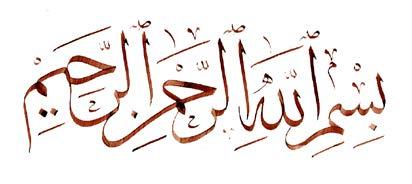
In the n ame of God, the Benef I cent, the m erc I ful
Letter from the President iii
Commendations for the College v
In Memoriam: Dr. Eva Brann vi
Academics 1
Commencement 3
BA Spotlights 8
The MA Program 18
Academic Growth 21
The Honors Program 23
Admissions 25
Harvard-Zaytuna Symposium 28
Faculty Activities 31
The Calligraphy Class 36
Alumni Voices 38
Public Engagement 41
The Online Courses 42
Ramadan at Zaytuna 48
Rabi al-Awwal 52
Center for Ethical Living and Learning 54
The Zaytuna Bookstore 56
First Command Book Club 59
New Publications 61
Public Events 64
Renovatio 69
Emir-Stein Center 70
College Operations 71
New Properties and Upgrades 72
Donor Voices 75
Financial Review 77
d ear f riends of z a Y tuna college,
This year brought great tribulations but many blessings too. Ibn ‘Aţā’illāh reminds us that “Whoever thinks that God’s grace doesn’t always accompany the divine decree suffers from myopia.” While we have all grieved over the horrors raging in Gaza, our faith reminds us not to let fear, outrage, despair, or grief consume us; instead, we must keep in mind that God’s mercy never fails those who seek it, and God’s grace is ever present. “Do not lose hope in God’s mercy, for God certainly forgives all sins” (Qur’an 39:53).
Imam Aĥmad relates a tradition in which Jesus İ was asked about those “who neither fear nor grieve,” and he replied, “They are those who see the inward reality of the world while others see only its outward.” While the current outward reality displays calamities and conflagrations, genocides and abominations, the inward reality of the possibility of drawing near to our Lord through worship and good deeds is always available even in the most troubled times.
At Zaytuna College, our mission to train young minds and nurture their characters continues, so they may always have the intellectual and spiritual tools within them to navigate the often-trying outward realities and to stay steadfast in study and supplication even as the vexing whirlwinds rise around us. This report shares what God’s grace, and the blessings of your support, bestowed on our College in 2024—in academic programs, public engagement, and campus expansion and growth.
I am overjoyed to welcome Dr. Munir Jiwa, a beloved and seasoned academic of Berkeley’s scholarly community, as our director of academic initiatives and partnerships. Formerly the director of the Islamic Studies Program at the neighboring Graduate Theological Union, Dr. Jiwa served on more than eighty MA and PhD dissertation committees—including my own and those of three other Zaytuna faculty members. Bringing an exceptional professional pedigree to Zaytuna, he not only serves as an ideal thesis advisor and guide for our students but also spearheads our program to engage other colleges, universities, and foundations to find fitting partners to enrich our standing and prospects. Besides these gifts, Dr. Jiwa brings his sanguine disposition, beautiful spirit, and love of service in faith that enriches our campus atmosphere.
Our MA program blossomed this year with a third concentration, Islamic Finance, added to the two tracks in Islamic Law and in Islamic Philosophy and
iii president’s report 2024
Theology. The first fruits of the MA program arrived with the publication of a critical Arabic edition of primary seminary texts with an extraordinary translation by two of our graduates, Justin Poe and Marwan Tayyan.
We have already recorded—in our advanced studio—four online courses that we plan to launch this winter for the broader community. Taught by our faculty, the courses are in Constitutional Law, Comparative Abrahamic Theologies, Logic, and Rumi’s Mathnawi. More courses are planned for the coming months and years. We’ve also hosted community events, such as Zaytuna Day, our annual Mawlid event, and a summit on AI, ethics, and Islam. We had a major presence at the Bradford Literature Festival, the largest book gathering in the UK, where our new books were well received. At home, our faculty and leadership team members visited many vibrant communities, including New York, Dallas, Southern California, Salt Lake City, and more, and gave talks and hosted gatherings for supporters.
In our commitment to iĥsān and to make Zaytuna a place that embodies and exhibits beauty, we renovated and adorned the gardens, campus mosque, and classrooms and started to build a library on our lower campus. By the grace of God, we purchased an outstanding seventeen-acre property within a ten-minute drive from the campus. Underwritten with a generous gift from the Ansari family, it will be the new home for our sunnah sports as well as a future retreat center, where we hope to host year-round community educational programs, God willing.
We’ve made significant progress toward developing a K–12 curriculum for parents and educators, and we plan to host a summit to confer with educational leaders about how to effectively teach our young in their formative years.
This report reflects many—but certainly not all—of the blessings we’ve witnessed at Zaytuna this year. We have immense gratitude for the successes you have enabled us to realize by the grace of our Lord. Yet, even as we look back on this year gratefully, we cannot forget the countless victims and martyrs of the many crimes against humanity, especially those in Palestine, who have witnessed man’s inhumanity to man in ways unimaginable to those of us secure in our person and our property. May the sincere hopes expressed by the many protesters to those in authority and the petitions to the Real Authority be realized.
With gratitude,

Hamza Yusuf President,
z a Y tuna c ollege
president’s report 2024
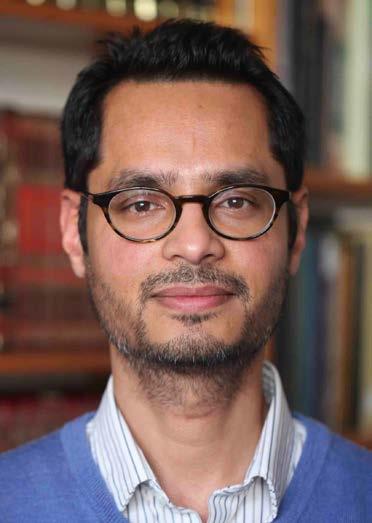
“Zaytuna College is a rare institution that aims to instill deep knowledge of the Islamic tradition through its rich variety and textual traditions while embracing the broader world of which Islam is a part. Not only do its students and faculty have a remarkable learned foundation, grounded in languages and technical expertise within Islamic studies and the general liberal arts, but they also approach learning as a spiritual exercise and as a way of life. It can serve as a model for anchored scholarly innovation in our global and unsettling age.”
asad q. a H med
Magistretti Distinguished Professor of Middle Eastern Languages and Cultures, University of California, Berkeley
“Can Zaytuna become equal to or greater than Harvard, Stanford, or any other American university? What other institution equips students with the tools to succeed in their spiritual and material life? At Zaytuna, students don’t have to choose between the two; their education prepares them for both.”
Community Volunteer, Greater Houston


We’re saddened to mark the passing of Dr. Eva Brann, an author, a philosopher, an original and deep thinker, and an anachronism in our illiberal age. She was a dean of St. John’s College where she taught for sixty years—and someone who became a friend and a lover of Zaytuna College late in her life.
A recipient of the National Humanities Medal, Dr. Brann earned her PhD in archeology from Yale University but is widely known for her nearly twenty books on philosophy, many written in her energetic prose that delighted in the unexpected and remained far from the prosaic language of the academy.
After President Hamza Yusuf first invited her to address Zaytuna’s students in 2017 for a memorable talk on liberal education (see photo above), Dr. Brann developed a close relationship with both him and the College. She delivered the 2021 Commencement Address at Zaytuna and participated in captivating public conversations with President Yusuf, both for the College and for its journal Renovatio. She became a regular contributor to Renovatio, served on its Board of Advisors, and described it as an “archetypal American phenomenon—America at its best.”
In that first talk at Zaytuna, Dr. Brann placed learning how to read as the practical purpose of a liberal education—but only “if taken largely enough.” And then, in her characteristic way of embedding an insurgent idea where it’s least expected, she defined reading as “knowing how to interpret everything from the secrets of the book of nature to the expressions of the human face, from the subtleties of poetry to the potencies of mathematical diagram. What is the truest profit of learning literacy? It’s simple: It eradicates boredom. And boredom is the most dangerous human condition; it breeds cleverly rationalized violence.”
A fitting reflection on Zaytuna’s mission—and our time. To God we belong, and to God we shall return.
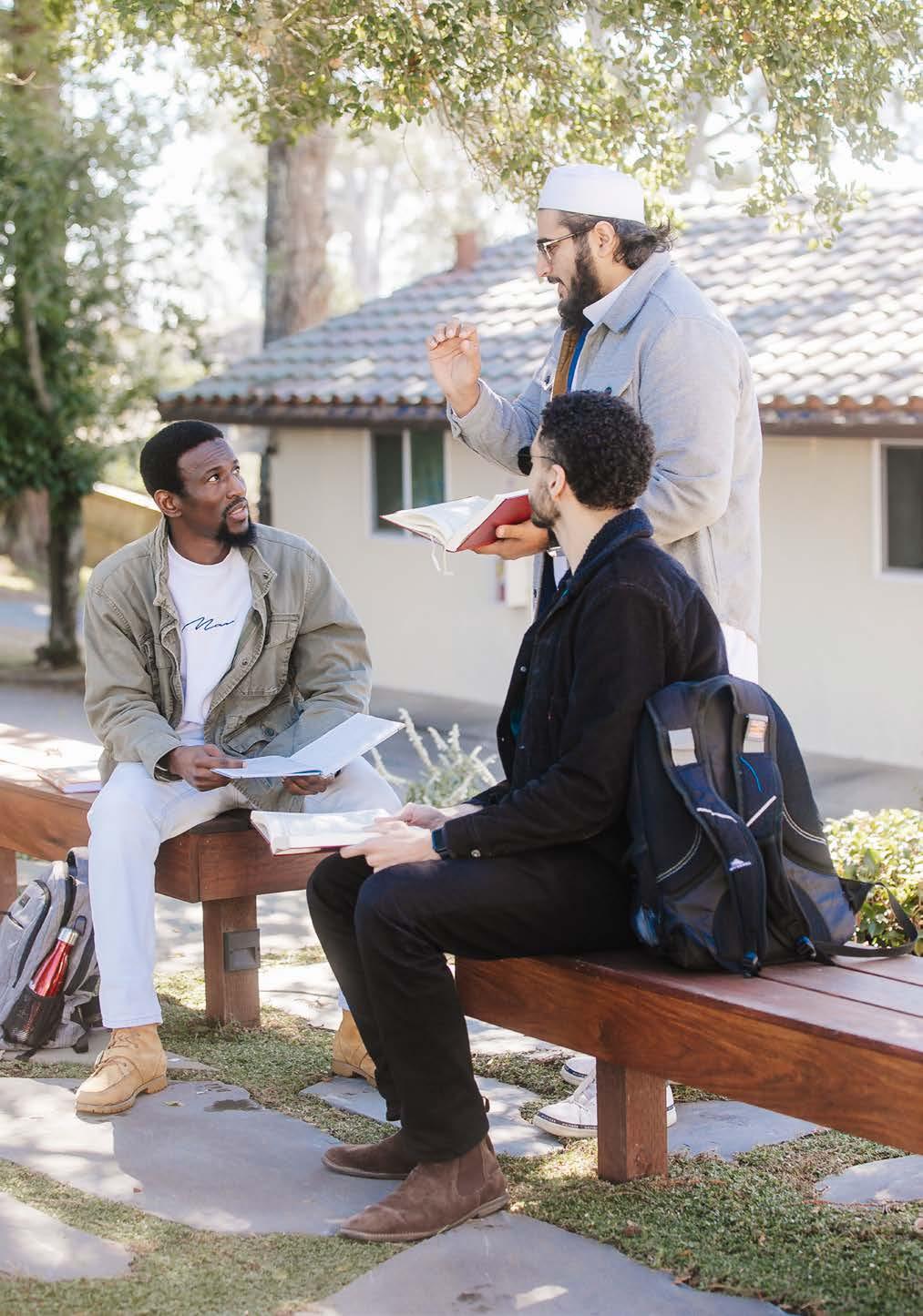
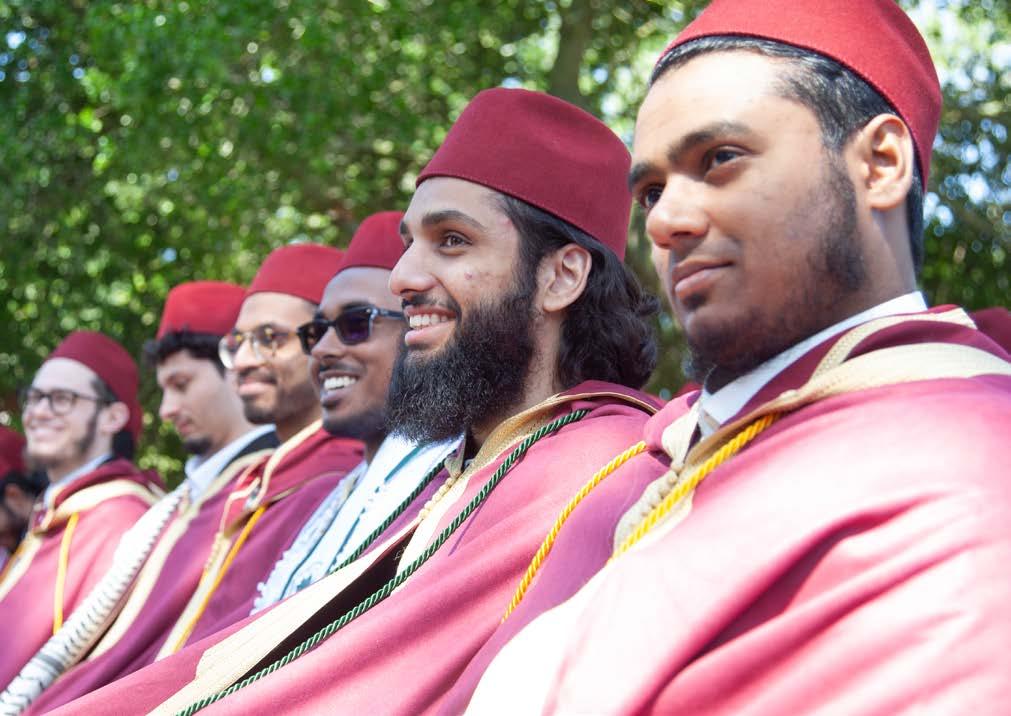

“Almighty God Is Beautiful, and Loves Beauty”
TH e 2024 commencement ceremon Y took place in the newly inaugurated Kajani Gardens on a clear and sunny Sunday morning in May, in the dappled shade of the redwoods, with sweeping views of San Francisco Bay. It was a fitting setting on the upper campus to celebrate the twenty-one departing students and to hear an exhortation to not only appreciate but also bring beauty into the world and shine brightly in dark times.
Beauty was the first and last word of keynote speaker Dr. Angel Adams Parham’s impassioned appeal to graduates to bring beauty to a world in dire need of it. Dr. Parham, an associate professor of sociology at the University of Virginia and an advocate of classical education, framed beauty as integral to flourishing. Among the transcendentals, she said, beauty often comes last, after truth and goodness; it gets less attention, but it has a unique power to guide us back to truth and goodness when other means fail.
She reminded graduates that their Zaytuna education equipped them to live the way of beauty that draws others to aspire toward goodness, truth, and justice. “As you go forth now into the world,” she said, “illuminate the path that leads to truth, shine a light on obscured byways that lead to goodness, and point the way to stepping stones that bring us closer to justice. Do this by living a life that is a testament to the transcendent, transformative power of beauty.”
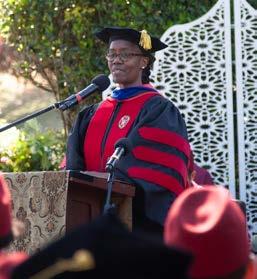
“As you go forth now into the world, illuminate the path that leads to truth, shine a light on obscured byways that lead to goodness, and point the way to stepping stones that bring us closer to justice.”
d r. a ngel a dams Par H am
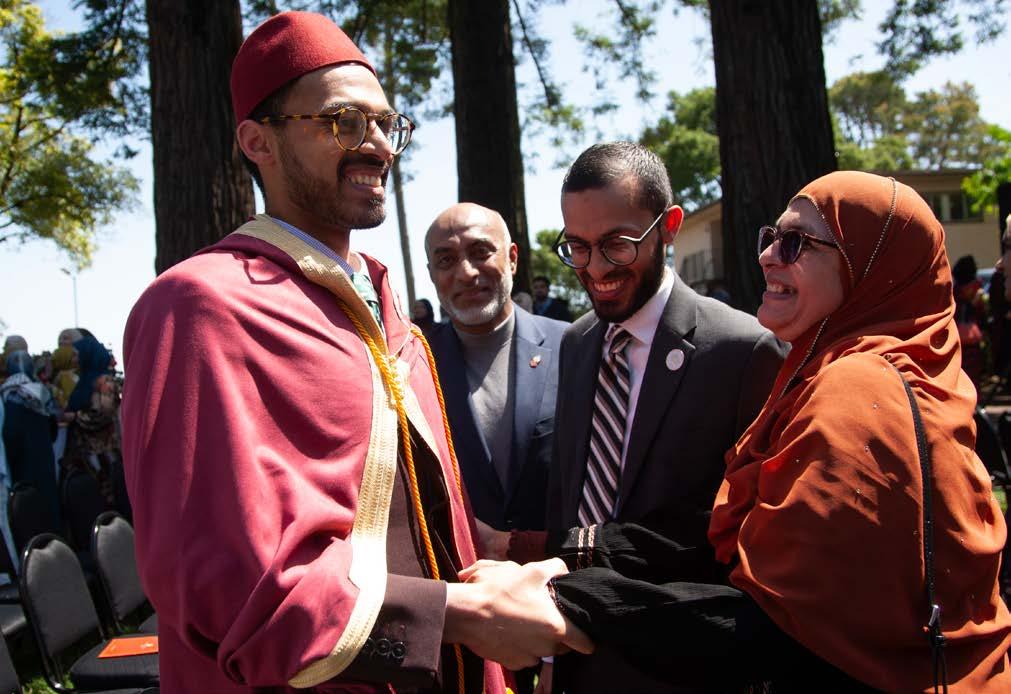
The graduating students from both the BA and MA programs listened closely, seated in the front row with an enthusiastic assemblage behind them of some three hundred family members, friends, and supporters of the College.
“Education is what we believe cultivates our humanity,” President Hamza Yusuf said earlier, in his opening remarks. He noted that the qualitative studies known as humanities are known in Arabic as adab—a beautiful word that encompasses courtesy, comportment, civility, and discipline. Quoting the great scholar al-Māwardī, he said, “Make the sincerity of your soul the treasure of intelligence.”
“This education has taught us what it means to be human. We actualize our humanity by living with adab.”
sa H al var W ani
He reminded the graduates that existence itself is a great gift, fragile and fleeting, and urged them to rise above the clouds of despair that so many succumb to easily. To be hopeful, and even happy, in dark times is not easy, he said, but quite necessary. The truly happy people know all the reasons they shouldn’t be—and yet they remain happy. Our Prophet Ş, known as the smiling one, taught us that a smile is a form of charity. In these times of tribulation, he said, it is wise to remember the Prophet’s radiantly hopeful disposition, which never wavered in spite 4
P resident’s re P ort 2024
of the continuous and immense struggles he faced.
“Keep your sanity where the world can’t reach it,” President Yusuf concluded, quoting Thomas Cleary, a translator of the Qur’an and author of eighty books. “Celebrate the humanity within you. Be grateful it hasn’t been lost.”
The three student speakers— BA graduates Amina Hafeez and Sahal Varwani and MA graduate Ahamed Yusuf Sulaiman—each reflected on the gifts of their time at Zaytuna. Amina spoke of discovering among her cohort the most beautiful kind of friendship, one in which each admires the good in the other and encourages them to pursue it. Her new friendships at Zaytuna, she said, were with students from different backgrounds—but they were united in their intention to seek God’s pleasure. Sahal reflected on receiving a holistic education that cultivated his mind, body, and soul. “This education has taught us what it means to be human,” he said. “We actualize our humanity by living with adab.” Ahamed recalled the steadfast commitment of esteemed teachers, noting that by sitting at their feet, he found a treasure trove of wisdom. Each graduate expressed heartfelt thanks to faculty, staff, supporters, family, friends—and above all, to God.

In his closing prayer—after honoring families, donors, faculty, and staff—Imam Zaid Shakir prayed for love and beauty to grow forever in our hearts. “May we love for the sake of our Lord, a love that transcends our passions, prejudices, and imperfections,” he said. “Almighty God is beautiful and loves beauty. May God bless us to remain, for all eternity, lovers of beauty.” He also prayed for those who are suffering—in Gaza, Sudan, Ukraine, and elsewhere. In these and other places of devastation, he reminded everyone, are beautiful people who want to lead beautiful lives and make the world a more beautiful place. “May they be blessed to live in dignity and peace.” Then, turning to the graduates, he said, “Whatever you do, do it from love and with the intention to contribute something beautiful to this world. We love you.” Ð
Bilal Ismail Acevedo
Finding Consensus by Disproving Difference: How Knowing the Conditions for Disagreement Helps in Determining When Consensus Has Occurred
Musab Ibrahim Ahmed
The Demon of Distraction: Acedia and Ghaflah in Christianity and Islam
Hala Amine
Islamic Ethical Teachings as Remedies for Mental Health
Ali Ahmed Rafique Chaudhry
The Emergence of the Racial Self: An Analysis of the Role of Race in Identity
Amina Safa Hafeez
“Deficient in Intellect and Religion?”: An Attempt to Understand the Hadith Nāqiśāt ¢Aql wa Dīn as It Was Originally Intended
Javeria Tariq Khan
Différance and the Divine: An Analysis of Mohammad Arkoun’s Deconstruction of the Qur’an
Safi Rehman
A Henological Approach to Knowledge: The Unitary Aspect’s Role in Taxonomizing the Principles of a Science
William Jonah Rudolph
A Critical Verification of the Extent to Which Modal Propositions Admit of Rational Division
Taariq Luay Richard Smallman
Imam al-Ĥaddād’s Contextualization of the Iĥyā’ ¢ulūm al-dīn
Hana Fardin Utama
In the Court of God: An Analysis of Rachid Ghannouchi’s Popular Sovereignty
Naureen Kakkottakath Valappilepurayil
Aiming for the Mark: Archery and Cultivating the Sunnah of Well-Being
Sahal Musa Varwani
With Rhyme and Reason: Imam ¢Umar al-Kharbūtī’s Logical, Rhetorical, and Dialectical Reading of Imam al-Būśīrī’s Burdah
Wajiha Taqwa Wohid
Beyond the Mind’s Eye: Prioritizing Islamic Insights in Psychology
Hafsah Muneerah Ya-Sin
Divorcing Marriage of Feminism: On the Incompatibility of Modern Feminist Principles and Healthy Marriage
Nabil Zaman
A Ring of Pearls: Qur’anic Coherence and Imam al-Biqā¢ī’s Nażm al-durar
Muhammad Umar Ahmed
From Dialectic to Demonstration: Exploring the Umūr ¢Āmmah and Their Impact on Later Kalam
Aibope Kemeldinova
The Ontology of the Human Soul: Tracing Theoretical Evolution from Early to Late Kalam Periods
Maryam Muslim Qazi
The Role of the Principle al-Ďarūrah Tuqaddaru bi-Qadarihā in Determining Textual Indications
Ahamed Yusuf Sulaiman
Typologizing Taĥqīq: Illustrating the Multifaceted “Acts” of Verification in the Al-¢Aqā’id al-¢Ađudiyyah Literature
Danielle Nicole Swan
Preventing Harm and Promoting Liberty through a Synthesis of Islamic Ethics and Law
Kashaf Zaman
Beyond Equity and Arbitrariness: Fakhr al-Islām al-Bazdawī’s Conception of Istiĥsān

i n an age driven BY discord and disbelief, believers are bound to face challenges to their faith traditions—whether about the existence of God, the presence of evil on earth, or how science accords with religion. Responding to such questions—be they amicable or hostile—requires intellectual rigor and a deep understanding of the consonancy of reason and revelation in religious scholarship.
Apologetics—the discipline of “speaking away” claims against religion through reasoned argument—is a staple of Christian college curriculums. In Spring 2024, Zaytuna introduced its own apologetics course to prepare students to confidently engage critics of Islam and substantively contribute to the broader public discourse on religion.
Dr. Ali Ataie, dean of undergraduate studies, aims to revive the art of intellectually rigorous, respectful dialogue through the apologetics course. Dr. Ataie traces his encounter with a rising anti-religious sentiment in the West—and a particular antipathy toward Islam—back to September 11, 2001. Later, as New Atheism reared its head in the public square, he participated in debates about religion that only seemed to increase animosity and polarization. Reasons for this can be found in
the Qur’an: “Call people to the path of your Lord with wisdom and wise exhortation. And dispute with them in the most virtuous manner” (16:125). Wisdom and good character, then, are prerequisites to the art of persuasion. Without virtue, intellectual brilliance descends into arrogance; without sound knowledge, humility and compassion lead to weak arguments.
The new course is a culmination of a liberal arts education at Zaytuna—an opportunity for seniors to apply knowledge and critical thinking skills acquired during their education at the College. In its inaugural semester, MA students from the Islamic theology and philosophy concentration also attended the course while renowned visiting scholars delivered guest lectures in their areas of expertise: interdisciplinary researcher Dr. Shoaib Ahmed Malik, who holds PhDs in both chemical engineering and theology, lectured on science and religion as well as New Atheism; Dr. Caner Dagli, a scholar of Islamic philosophy and metaphysics, helped students better grasp how the problem of evil is understood in Islam; and President Hamza Yusuf gave a talk on the challenge of critical theory, an approach popular in academia that views society primarily through power structures.
Unlike lower-level courses at Zaytuna, which are more didactic, students in Apologetics engage in lively discussions with peers and professors, thereby strengthening arguments and practicing intellectual humility. For their final project, students prepare a presentation on how they would refute a spurious claim about Islam and its intellectual tradition, while their classmates seek to challenge their argument. “This course put into context all the other subjects we’ve studied at Zaytuna,” says Sahal Varwani, who graduated in May, “and Dr. Ataie clearly displays intellectual rigor and refined character in the classroom, so we learned from his example.”
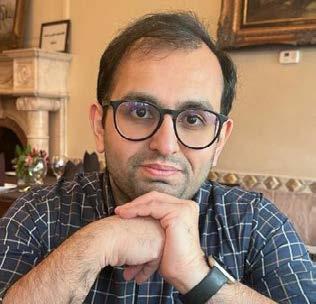
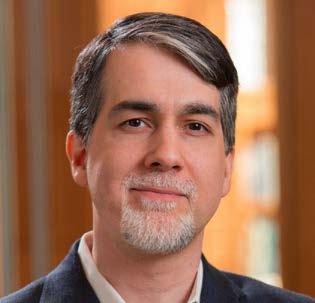
For Dr. Ataie, student presentations offer a deeply rewarding aspect of teaching: the opportunity to learn from his students, as he found himself taking notes last year. The seniors found ways to strengthen arguments they learned in class: clarifying points with compelling graphics, presenting research he’d never seen, and citing new passages from assigned texts. “Zaytuna students are uniquely talented,” says Dr. Ataie, who has taught at several other institutions. “I’ve never seen this level of academic sophistication, high intellectualism, and devotion to learning.”
With its deep inquiry into the most vexing claims against Islam, the Apologetics course also empowers students to think critically about their own faith tradition. Students who study politically charged issues such as Orientalism, Zionism, or arguments against the existence of God fortify their faith through intellectual inquiry. They learn rational arguments for their belief and begin to understand that there is no contradiction between reason and revelation in Islam.
Jonah Rudolph, a graduating senior, expected to improve his debating skills in Apologetics—and was pleasantly surprised to discover the course was about much more than winning an argument. “I was inspired by the rigorous honesty of our guest speakers—and their ability to acknowledge complexity,” says Jonah. To educate others about Islam, he pointed out, is to offer da‘wah, or an invitation to a banquet; an antagonistic invitation appeals to no one.
“The Prophet, peace be upon him, harbored no animosity toward those who opposed him,” he continues. “He felt a deep love for others and a desire to liberate them from false ideas.” In Apologetics, students follow the prophetic example by attuning to their audience, seeking to understand their assumptions, and engaging them in the most respectful and convincing manner. In doing so, they discover how to transform polarizing debates into opportunities for enriching engagements. Ð “I was inspired by the rigorous honesty of our guest speakers— and their ability to acknowledge complexity. The Prophet, peace be upon him, harbored no animosity toward those who opposed him.”
jona H rudol PH , class of 2024
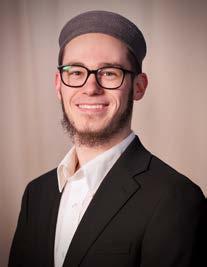
“If students take one lasting insight from this course, I hope it is to put virtue back at the center of civic life.”

tH e li B eral arts education at Zaytuna College, while grounded in devotion, seeks to cultivate virtuous and wise citizens who are schooled and competent to contribute to contemporary society. While many Zaytuna courses, from those in logic and rhetoric to economics and philosophy, prepare students to this end, the Politics course for second-year undergraduates (which will be named Politics and Democracy in 2025), taught by Fr. Francisco Nahoe, lays the foundation for meaningful engagement in civic life.
In Fr. Francisco’s class, as students study major figures in the history of political theory such as Aristotle, Ibn Khaldun, and Plato, they begin to analyze and even question the design of political and social orders. Exploring how these thinkers responded to the challenges of their times, students gain insights into how political philosophy shapes government institutions. They also gain a broader and deeper understanding of familiar concepts such as justice, democracy, citizenship—and even politics itself.
“I discovered that politics is a foundational science,” says Lyba Hussain. “It relates to so many other disciplines—ethics, economics, anthropology, sociology—so gaining an understanding of politics also gives me greater access to other disciplines.”
Early in the course, students learn that Aristotle saw participation in civic life as an expression of moral character. Just as ethics is concerned with individual virtue, politics is concerned with virtuous action in the public realm—it is about striving for civic virtue and a clean collective conscience. This may seem like an impossible dream in our libertine and licentious world—but so long as the possibility lives in the human heart and imagination, individuals and communities will continue to strive to make it a reality.
“Our current system places power, not virtue, at the center of politics,” Fr. Francisco says. “And that is a debasement of politics; if students take one lasting insight from this course, I hope it is to put virtue back at the center of civic life and restore integrity to politics.”
For Abdel Fattah Bauer-Gauss, a junior, the most impactful aspect of the course was studying Plato’s Republic “I was fascinated,” he says, “by Plato’s concept that a political community ideally functions like a single soul and shares its structure.” He also appreciated reflecting deeply on ideas like how justice is defined and its relationship to social conventions.
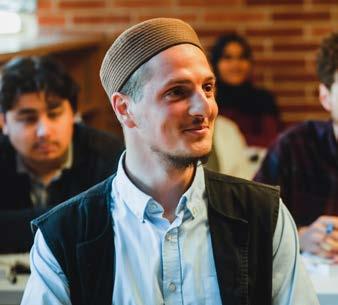
“I was fascinated by Plato’s concept that a political community ideally functions like a single soul and shares its structure.”
aB del f atta H Bauer- g auss, class of 2026
Fr. Francisco takes his own civic responsibilities seriously—and like many immigrants, he feels accountable to two cultures. Raised in the United States by his Irish American mother and his Polynesian father, Fr. Francisco grappled for years with the question of how to serve his indigenous community on Rapa Nui, also known as Easter Island. Recently, the island’s council of elders and its development commission asked him to take responsibility for identifying, recovering, and repatriating ancestral remains from North American museums and anthropology departments.
When he was a boy, Fr. Francisco recalls, civic virtue was taught in elementary school. Back then, American children learned early that citizenship was about how we treat one another and serve our communities. Today, Fr. Francisco appreciates working at an institution that restores the centrality of civic virtue. By integrating adab, or comportment, into every aspect of higher education, he says, Zaytuna teaches students at least as much about citizenship as they might learn in his course. Ð

n o et H ical deli B eration in the public realm arises in a vacuum. At a superficial level, conversations about contemporary issues like affirmative action, abortion, or income inequality get easily clouded with emotion or caught up in partisan politics. At a deeper level, each conversation arises from a particular history and underlying philosophy, whether the participants know it or not. And in Zaytuna’s Ethics course, which undergraduates take in their final year, students learn to understand contemporary moral challenges by studying the rich resources found within the Islamic ethical tradition as well as influential philosophies of the modern era.
Given the likelihood that the future careers of most of Zaytuna’s students will involve ethical decisions and deliberations, the course might well provide them the guidance to navigate those challenges. This, however, is not the primary objective for the course. Shaykh Faraz Khan, who taught Ethics for the class of 2024, does not fixate on future outcomes—because those, he knows, belong to God almighty. “In the Islamic tradition,” he says, “scholarship is service.… The true scholar/ sage was one who saw himself as a khādim, or servant of knowledge.” In the class, he guided students through deep reflections on morality from the perspectives of their Islamic heritage and modernity. As part
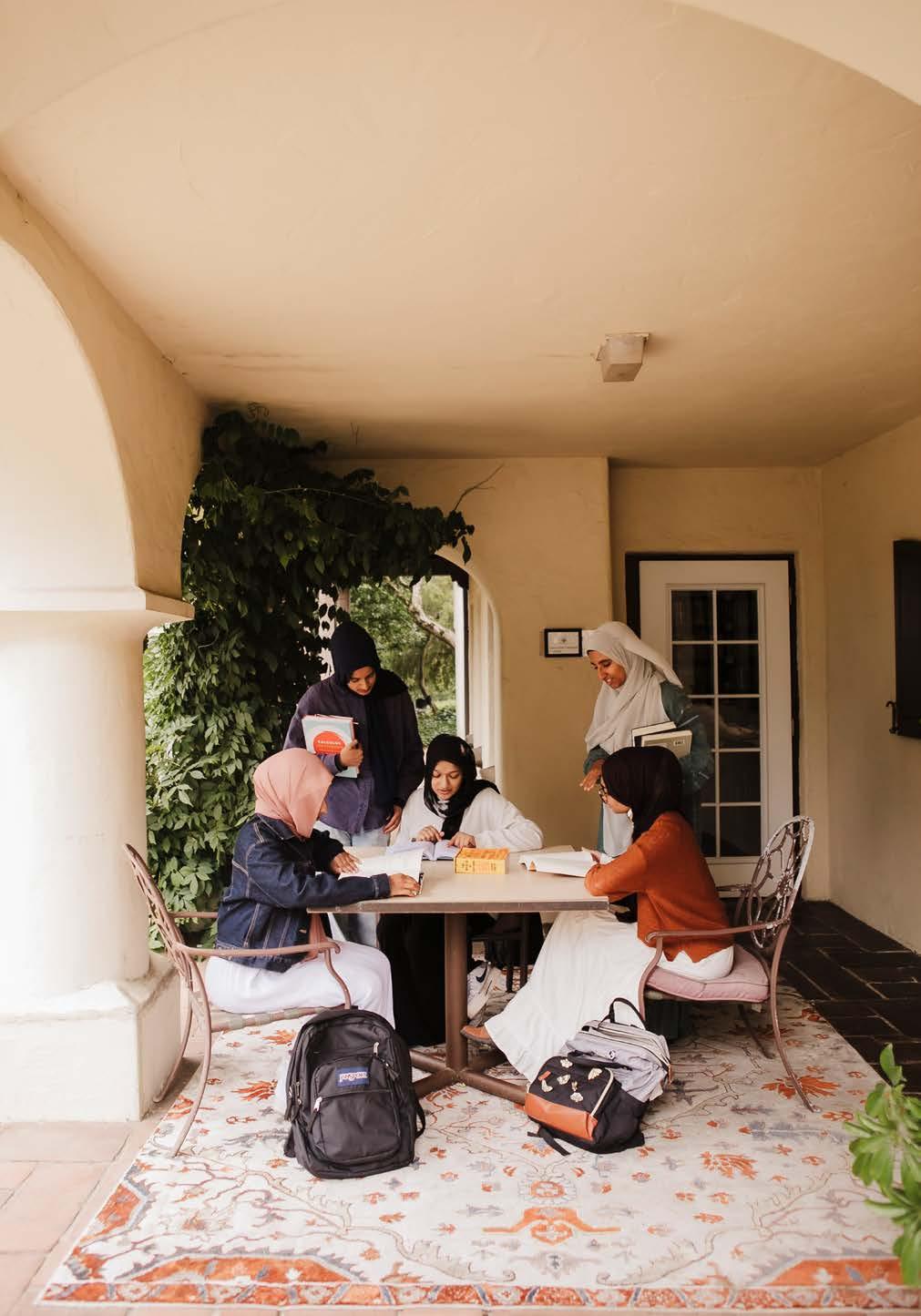
Shaykh Faraz says his first priority is to help his students cultivate their souls and embark on a lifelong pursuit of virtue, which is a moral obligation for Muslims.
of a broad survey on Islamic ethics, his students studied al-Rāghib al-Iśfahānī’s Kitāb al-dharī‘ah ilā makārim al-sharī‘ah, a synthesis of ethical philosophy and revelation that was so important to al-Ghazālī that he carried it everywhere, and it informed his own seminal work on Islamic ethics. In addition, the students explored the deontological ethics of Kant, the utilitarianism of Mill, and other influential Enlightenment philosophies.
The broad approach allowed them to compare revelation-based ethics to rule-based ethics and discern the common grounds as well as critical differences. In this way they began to acquire the tools to approach contemporary ethical challenges with a strong foundation in their own religious tradition and the ability to recognize philosophical fallacies that too often shape modern discourse.
“Shaykh Faraz is a unique instructor who tries to embody what he teaches,” says former student Nabil Zaman. “To study a text with him is to learn much more than content. He applies the principle of charity to textual interpretation. He does his best to be fair to the text and its author. He’s also not afraid to point out fallacies, but he does so with humility.”
Shaykh Faraz says his first priority is to help his students cultivate their souls and embark on a lifelong pursuit of virtue, which is a moral obligation for Muslims. And as al-Ghazālī taught, all positive political change begins with rectifying the self—so their personal ethical development will undoubtedly impact the societies in which they live.
Wherever life takes them, Shaykh Faraz prays his students will become ambassadors of the Good. As a lifelong student himself, he walks alongside them on the path of cultivating the soul and seeking knowledge. Each time he teaches al-Iśfahānī’s text, he shares another dose of medicine the world presently needs. Ð

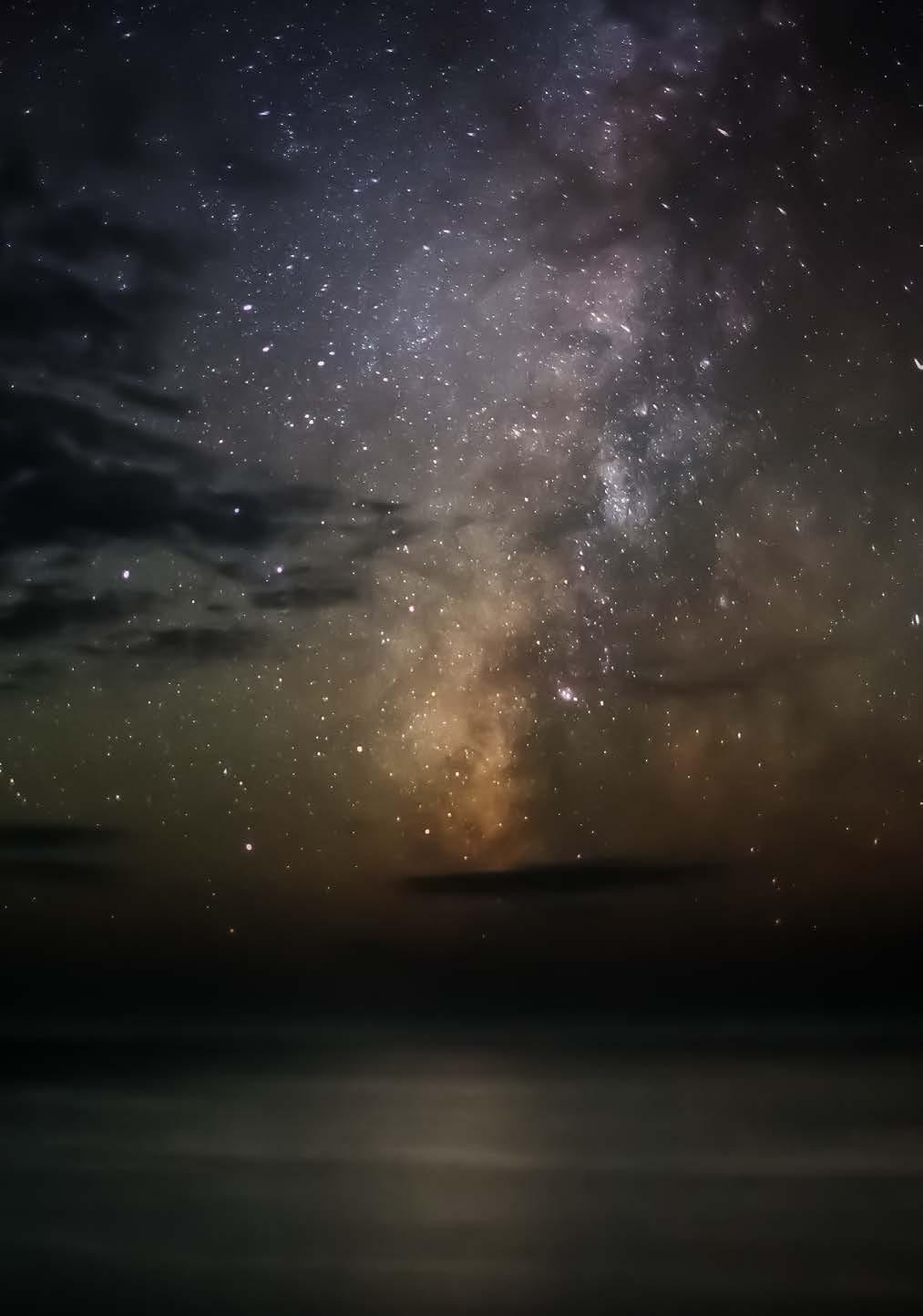
“The light from the stars in our night sky is ancient light. It left those stars decades ago, or hundreds of years ago, or even thousands of years ago or possibly even billions of years ago. We are seeing the past when we look out into the night sky.”
dr. Y oussef ismail
Each year, Dr. Youssef Ismail leads the senior Astronomy class on a field trip near Big Sur on the Central California coast, the closest dark sky location to Zaytuna’s campus, to observe the Milky Way. The annual trek is one of the many ways Zaytuna’s students experience an education designed to continually remind them of God’s creative act. Here’s a reflection from this year’s trip by Dr. Ismail that he sent to the Zaytuna community upon returning:
“The light from the stars in our night sky is ancient light. It left those stars decades ago, or hundreds of years ago, or even thousands of years ago or possibly even billions of years ago. We are seeing the past when we look out into the night sky. Yet, for the entirety of human existence those stars that we witnessed on Saturday evening have been there all that time, guiding humans across the land and sea, acting as beacons for orientation, serving as timekeepers of the night and of the yearly passing of seasons.
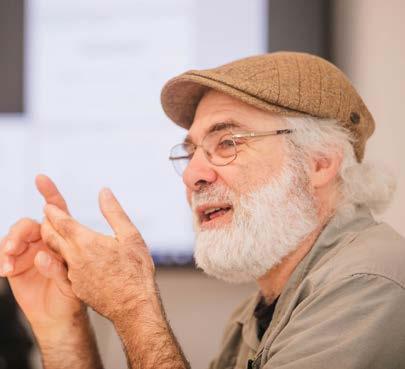
The relationship humans had with the stars in the past was amazing and is sadly missing from the modern world, except through images made by deep space telescopes a million miles away, parked out in space returning images of things we cannot see from Earth. But the view from Earth is no less amazing if we just make the effort to get out of the light pollution of our own technology and find dark skies so we can marvel once again at the grandeur of the creation that Allah Ű made for us and resume the humble place we hold in all of it. The gift of light allows us to see this beautiful creation and praise the One who made it all.” Ð
Opposite page: The heart of the Milky Way with Sagittarius poking through the clouds and Corona Australis, the southern crown, just below the clouds on the left edge of the frame. (Photo: Dr. Youssef Ismail)

W H en Mr. Mahsuk Ya M ac , the dean of graduate studies, was invited to support Zaytuna College’s new MA program, he saw an exciting opportunity to design a curriculum that combines the best of the traditional and modern educational approaches. A classically trained scholar of the rational and traditional sciences, Mr. Yamac knew well the strengths and limitations of classical instruction methods. Such an education in Islamic sciences emphasizes memorization, and study is heavily text-based; students spend many years studying a single book or two and acquire deep knowledge—but they often lack writing skills and the ability to critically assess what they have learned in light of other knowledge.
Western colleges and universities, on the other hand, offer Islamic studies degrees that cultivate these skills—but they lack the depth of contemplation and understanding students acquire in the classical education system. Survey courses in Islamic studies departments provide only a broad overview of their subject, leaving students lacking depth and mastery of primary sources. Their curricula emphasize contemporary texts—and even those are not assigned in their entirety.
“Contemporary texts are often like pacifiers,” Mr. Yamac observes. “They offer an immediate and superficial comfort, but they lack the nourishment provided by the essential sources of the Islamic tradition.”
Mr. Yamac brings a unique academic rigor to the graduate-level classes he teaches in epistemology, metaphysics, and philosophy. His students spend three semesters, for example, reading one classical philosophy text from cover to cover. While this may seem tedious, Mr. Yamac says once his students learn to access such a challenging classical text, they can access all others. “These shelves are full of ancient works on exegesis, hadith, jurisprudence, logic, philosophy, theology, and more,” he says, pointing to the bookshelves that line the walls of his office. “After completing the classical training provided in our MA program, students are able to access all these texts.”
Thanks to his extensive experience in curriculum design, Mr. Yamac helped establish two concentrations within the program—Islamic Law and Islamic Philosophy and Theology.
Now a third track, Islamic Finance, has been added. The new concentration shares foundational legal training with the Islamic Law track while providing specialized instruction in finance and trade within Islamic jurisprudence. The program pairs the study of theory with an exploration of contemporary applications.
In the past, Muslims had little need to theorize about economics and finance as separate fields of study, so issues related to these areas were often discussed as topics in various texts from Islam’s legal or moral traditions. In the late twentieth century, Islamic economics and finance began to attract the attention of Muslim thinkers, but “Islamic” often
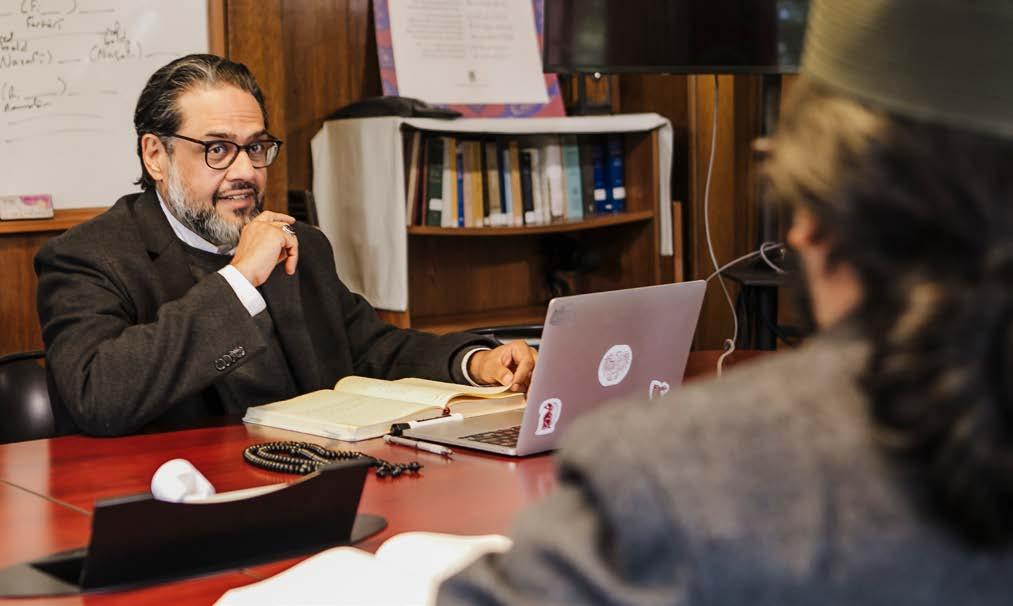
meant simply filtering these modern subjects from ideas or practices considered not Islamic, an approach referred to as the Islamization of knowledge.
Zaytuna’s program is part of another approach, one that seeks to develop principles and institutions that are rooted, from inception, in Islamic moral values. “Many Islamic finance programs are training students to become employees in a system,” says Dr. Harun Sencal, an MA faculty member who teaches in the new track’s first year. “Our aim is not to just train and produce more employees.”
Rather, Dr. Sencal envisions graduates in Islamic finance pursuing PhDs to prepare them to contribute to the greater good and perhaps one day help set boundaries and offer ethical alternatives to the exploitive financial practices that mark our era. Or, he hopes, they leave with an entrepreneurial spirit and develop products and services that don’t just recreate existing structures but disrupt them. For example, he asks, can Muslims trained in their tradition of financial ethics develop a viable alternative to profit-driven health insurance?
Since the launch of the MA program in 2019, alumni have gone on to doctoral programs at UC Berkeley, the University of Chicago, Georgetown, and the Ludwig Maximilian University of Munich—and with the new concentration in Islamic Finance, the list of graduate institutions where Zaytuna’s alumni are making their mark will continue to grow, God willing. Ð
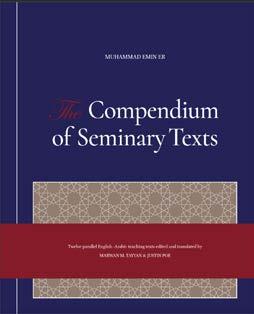
Zaytuna MA graduates Marwan Tayyan and Justin Poe, both from the class of 2022, edited and translated a new resource for traditional seminary sciences this year. Their translation of a series of primers on the fundamentals of language and thought from the Ottoman curriculum was published by the American Society of Islamic Philosophy and Theology.
Dr. Munir Jiwa P ossesses a résumé in academic leadership that glitters with diverse and influential experiences. But what Dr. Jiwa had not experienced, he says, was the vibrant culture of purposeful learning he has found at Zaytuna College, which he joined this year as the director of academic initiatives and partnerships and as an associate professor.
Long known to many faculty and staff members at Zaytuna, Dr. Jiwa served for seventeen years as the founding director of the Center for Islamic Studies at the Graduate Theological Union (GTU), located next door to Zaytuna’s lower campus in Berkeley. In that capacity, he advised graduate students in religion from around the world and served as associate professor of Islamic studies and anthropology; he has also held visiting positions at Stanford University and UC Berkeley. He has extensive experience in bridge-building programs, including the UN-affiliated organization Religions for Peace, for which he helped to establish interreligious councils around the world.
What Dr. Jiwa finds distinctive about Zaytuna is its holistic approach to seeking knowledge. Where higher education in religion often demands separation—science versus religion, for example—Zaytuna’s students perceive integration. “Bringing together the intellectual and the spiritual with civic engagement, as we do at Zaytuna College, is urgently needed in our time of environmental, economic, sociopolitical, and spiritual crises,” says Dr. Jiwa.
“Bringing together the intellectual and the spiritual with civic engagement, as we do at Zaytuna College, is urgently needed in our time of environmental, economic, sociopolitical, and spiritual crises.”
dr. munir ji W a
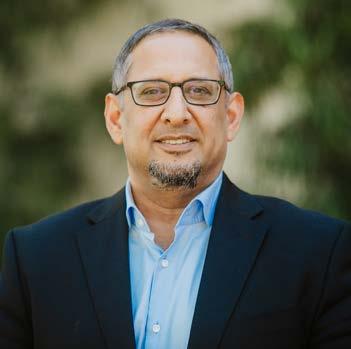
He wants to raise Zaytuna’s profile—and extend the benefits, excellence, and beauty of the Islamic tradition in academia and beyond.
“I have known Dr. Jiwa for several years, and I believe, inshallah, he will be instrumental in furthering our goal of becoming a preeminent
liberal arts college globally,” says President Hamza Yusuf. “He brings to us much experience coupled with a wonderful temperament and collegiality that has made him beloved to so many of the students, graduates, and teachers in his previous capacities. He is a wonderful asset to Zaytuna College, and I sincerely hope faculty and students benefit from his wealth of knowledge and experience.”

f illing k e Y r oles
Zaytuna filled two additional critical roles this year, introducing Dr. Asad Tarsin, a long-time member of the Zaytuna family, as a research fellow to help expand the Zaytuna Curriculum Series and Ustadh Yusuf Mullick, of the Arabic faculty, as the new director of the BA Arabic minor.
Dr. Tarsin already serves on Zaytuna’s admissions committee and previously taught Maliki fiqh at the College as an adjunct faculty member. He also frequently teaches and speaks at public programs for the College and has authored Being Muslim, a popular book in American da‘wah literature.
Ustadh Yusuf has been with the College in various capacities for several years, having served as an instructor at the Summer Arabic Intensive in 2010. In recent years, he has served as director of the summer Arabic term, in which rising freshmen and sophomores study the language for eight weeks. He takes the baton from Dr. Fadi Elhin, who has transitioned to the Zaytuna MA program. “Ustadh Yusuf brings vast knowledge, not to mention an inspiring love and passion for learning and teaching the Arabic language: the language of the Qur’an, the Prophet Ş, and paradise,” says Dr. Ali Ataie, dean of the undergraduate program. Ð
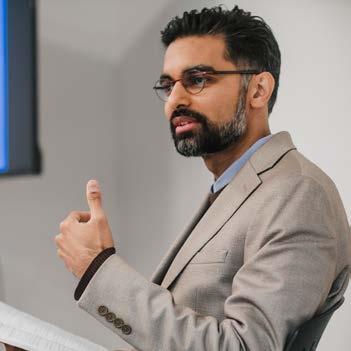
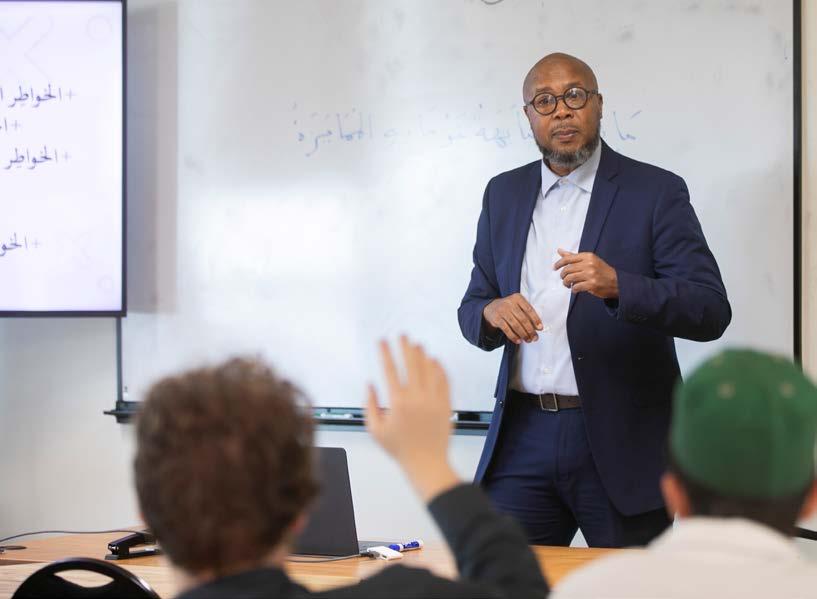
tH e re W ards of rising a B ove and B e Y ond the required courses and choosing to learn even more became real for junior Masah Alkhawam. “It was amazing,” she says, “to see how hadith was preserved for us by generations of scholars so that we could receive them and not even have a doubt that the Prophet Ş said those words.”
Masah chose to enroll in the Honors Program and has been deeply moved by her memorization of hadith, among other things. While rigorous and challenging, they brought her studies to life in a profoundly spiritual way.
The Honors Program, which is optional for BA students who meet the grade prerequisites, affords them the opportunity to immerse themselves within the traditional practice of memorizing and analyzing texts in their original Arabic, including sections of the Qur’an, hadith, and primers on subjects such as ¢aqīdah and fiqh. Eligible students
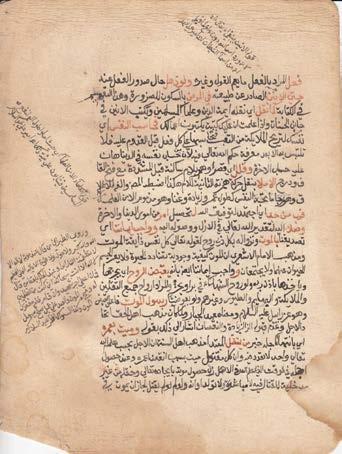
begin the program in their sophomore year and complete it by their senior year. The program spans nine subjects, which overlap the core topics of the BA curriculum and feature a very different, yet complementary, learning method.
This method is a more traditional form of study that provides students a mental map of subjects by memorizing simple, often versified, texts known as mutūn, many of which are the foundations for encyclopedic commentaries in the Islamic tradition. By grounding themselves in the initial matn, students have a working conception of the foundations of the subject, which both distills the fundamentals and facilitates further study.
Dr. Abdullah Ali, who directs the program, describes it as a hybrid of the teaching methods that predominate in the BA program courses and the more text-based MA in Islamic Texts.
“We encourage the teachers to help students understand the texts instead of the classes being more lecture-style,” he says. “The students focus on the grammar first, then on the vocabulary, then on the concepts so they can understand them all together as opposed to a beautiful but passive lecture.”
This requires concerted effort from both teachers and students. Indeed, Nabil Zaman, who graduated with his BA in 2024, became only the seventh student to successfully complete the entire Honors Program requirement.
“I’ve tried to impress upon the students that they develop a plan for how they will complete all the texts by the time they’re seniors,” he explains, “to make sure that we have more students successfully finishing the program.”
Masah finds this structured approach critical. “When you’re busy with school, it’s really hard to set aside time for memorization,” she says. “We all get tired and lazy, so I thought the obligation to memorize through a program would make it easier. Alĥamdulillāh, this happened!” Ð
president’s report 2024
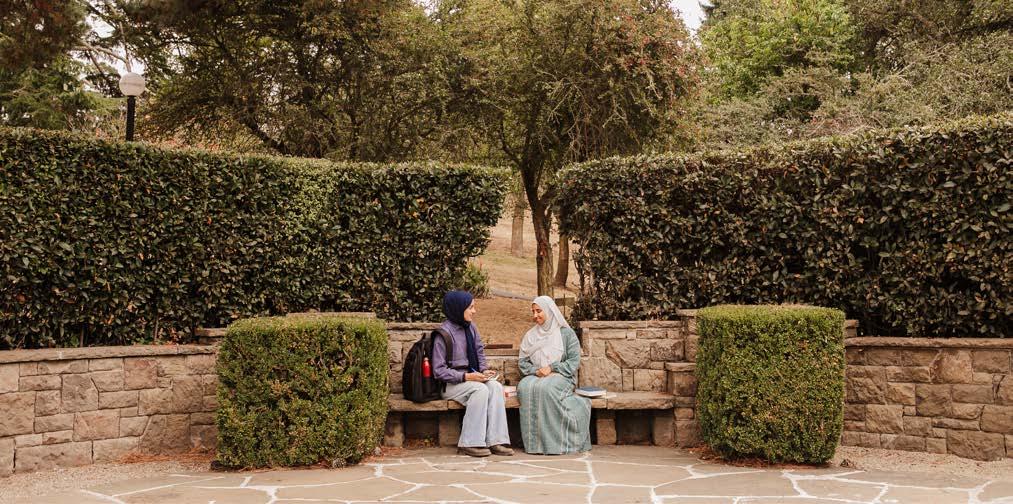
e ac H Y ear, t H e H urdles t H at admission applicants must clear raise a bit higher because Zaytuna’s BA and MA programs are getting more rigorous and because the College seeks the best and brightest students to admit.
Two years ago, an MA applicant applied to the College after completing the Dars-i Nizami curriculum at madrasah, followed by two years of specialized study with renowned jurist and exegete Mufti Taqi Usmani of Pakistan. He was admitted—and graduated in 2024 from the program—though he recalls his admissions interview as a rigorous experience.
MA faculty members not only presented him with new Arabic texts to read and engage with live during the conversation but also asked why he would stay the course at Zaytuna. The question invigorated him, providing an opportunity to demonstrate, in his own words, his longstanding interest in Islamic philosophy.
Zaytuna’s interview-based approach to BA and MA admissions is rare in the academy today, although it is still used at institutions such as Oxford and Cambridge and remains an essential, time-tested ingredient to assess applicants. With the arrival of its new cohorts in fall semester—the BA class of 2028 (with eighteen students) and the MA class of 2026 (with ten students)—Zaytuna’s total student body now stands at eighty-six, its largest ever.
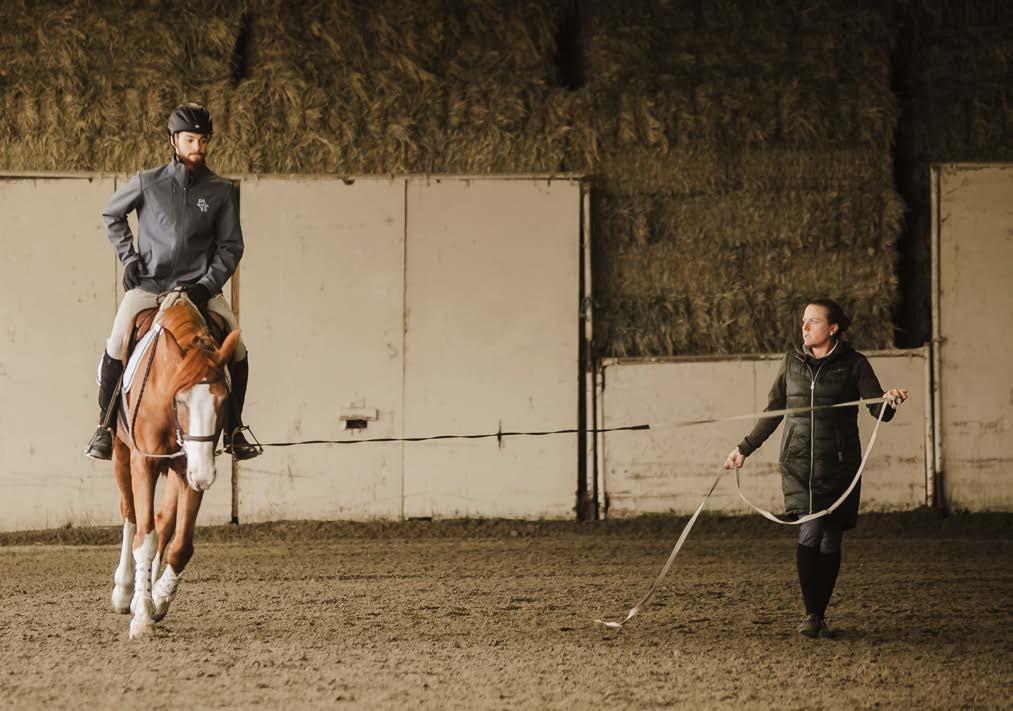
The new cohorts are diverse as can be; they come from as near as Berkeley and as far away as Qatar and speak different languages. One student trained as a first responder, another studied Arabic abroad, and several memorized the Qur’an; the cohorts include runners, photographers, artists, animators, and more. Their interests and backgrounds are richly varied, yet their reasons for choosing Zaytuna College are clearly aligned.
When asked what they sought in a higher education program, they responded:
• To acquire a holistic education that develops the mind, spirit, and body.
• To acquire a strong intellectual foundation in the liberal arts.
• To acquire critical thinking skills required to fulfill their Muslim duty as truth-seekers.
• To develop the capacity to apply their Islamic tradition to contemporary challenges.
• To study not only for grades but also for personal growth, in a serene sanctuary with spiritual companions.
By all accounts, the new cohort is even better suited for the rigors of the curriculum than previous ones. To some extent, this is driven by self-selection, as the college’s reputation for scholarship has grown. As admissions director Khwaja Ahmed observes, “Three years ago, our applicants were choosing between mid-tier state schools and Zaytuna. Now, our applicants are deciding between Zaytuna and top-tier schools, including the Ivy League.”
Across both the MA and BA programs, the Zaytuna admissions process illustrates much of what makes the college a distinct feature of the educational landscape: a small college where students study big ideas. Ð
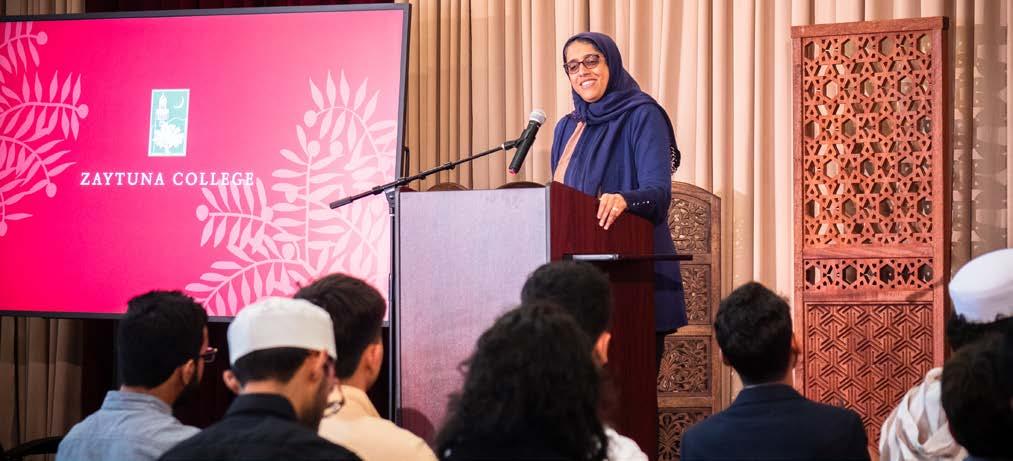
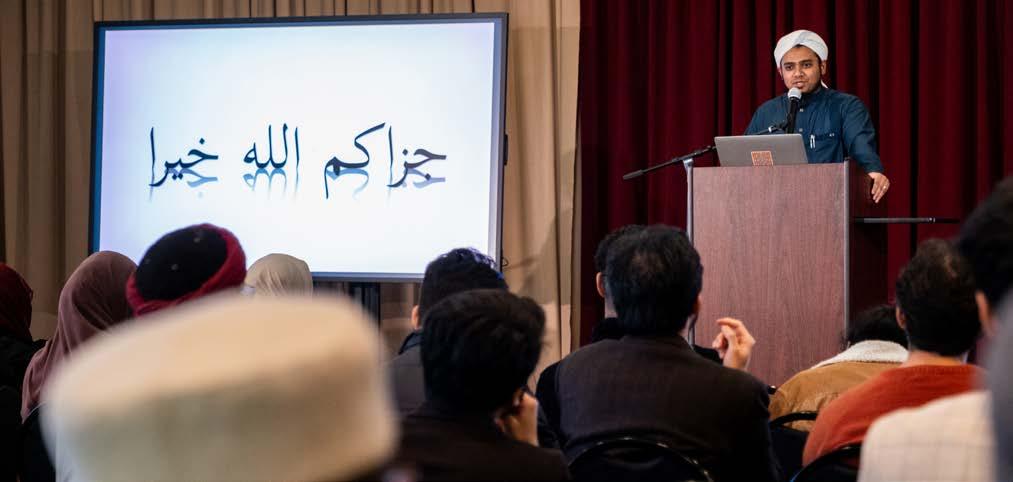
“Building
tH e origin of academic sc H olars H i P on Islam—and the question of whether such scholarship can emerge from within the Islamic tradition in the Western academy—became a topic of discussion at the second annual Harvard-Zaytuna Research Symposium. The keynote speaker, Dr. Asad Q. Ahmed, finds a dearth of research on Islam from within the tradition. He should know, given that he is the Magistretti Distinguished Professor in Middle Eastern Languages and Cultures at the University of California, Berkeley.
“What one needs is a recognition that there is a margin and a center, and one has to create a new type of empowering humanities where perhaps the non-Western elements and the canon can be constructed and sit at the center,” he said in his talk. “And I know this sounds revolutionary and rebellious, but I guess I’m getting old, so I’m allowed to say such things, and to dream!”
The symposium was hosted at Zaytuna’s campus in Berkeley, following last year’s inaugural sessions at Harvard University in Cambridge, Massachusetts. Led and organized by Zaytuna students and their counterparts from the Undergraduate Theologos Society at Harvard, the program aims to build lasting bridges while connecting faith and scholarship. Students from both institutions presented their research to peers and scholars alike and joined together for spirited
discussion over meals. The Harvard guests also sat in on Zaytuna’s BA course in apologetics, taught by President Hamza Yusuf and Dr. Ali Ataie, to gain a firsthand experience of Zaytuna’s pedagogy.
Dr. Ahmed’s keynote, titled “In Another’s Tongue” (Zabān-i-Ghayr in Urdu), explored Islam’s place in the global humanities. With practical examples from prose and verse in Arabic, Persian, and Urdu, he demonstrated the limitations of conventional academia in its engagement with classical Islam through the necessarily narrowed lens of translation.
“What one needs is a recognition that there is a margin and a center, and one has to create a new type of empowering humanities where perhaps the nonWestern elements and the canon can be constructed and sit at the center.”
dr. asad q. a H med
Dr. Ahmed pointed to the challenges of changing the narrative about the study of Islam in Western universities, saying that the field still has not fully grappled with the deliberate misrepresentation of the religion from the colonial era. “The idea has been in Western Orientalism that there was a long-standing decline within the Islamic tradition,” he explained. “This general idea and master narrative have been embraced by Muslims themselves. And despite what one does, and as much as one works into the sources and begins to produce new work, that narrative is very hard to let go of.”
Zaytuna students demonstrated the College’s distinctive pedagogy in their presentations. For instance, in“With Rhyme and Reason: Imam ‘Umar al-Kharbūtī’s Logical, Rhetorical, and Dialectical Reading of Imam al-Būśīrī’s Burdah,” Sahal Varwani (Ba ’24) engaged the work of an Ottoman scholar who showed the didactic aspects of Imam al-Būśīrī’s famous poetic ode to the Prophet Ş

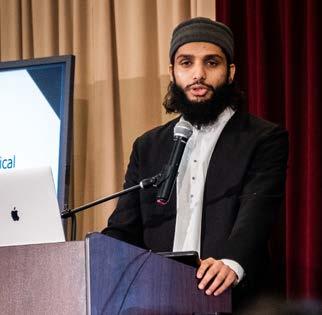
Mr. Mahsuk Yamac, dean of graduate studies at Zaytuna, was impressed by the quality of students and research from both institutions. He described the event as “a step forward for Zaytuna in strengthening its connections and collaborations with other institutions, fostering a more robust dialogue and exchange within the academic community studying Islamic studies and liberal arts in the Western context.”
Whereas Zaytuna students’ theses focused on the Islamic sciences, the Harvard presenters came from diverse fields within the university, ranging from public health to geopolitics. One of Harvard’s student presenters, Aqil Azmi, a senior in mathematics and philosophy, echoed Mr. Yamac’s reflection, pointing out that both institutions offer a liberal arts education, yet, he noted, they have “fundamentally different natures” because Harvard is a secular university and Zaytuna is an Islamic institution. “I feel like the main problem that Muslim students have in secular academia is just a lack of space to present ideas that are more orthodox in nature or conservative,” he says. “These kinds of symposia help provide a space where [Muslim students] can present their ideas without any fear of bias or a one-sided critique.”
Sama Kubba, a senior in Harvard’s joint BA/MA program in Middle Eastern studies, found herself feeling extremely grateful for the fellowship and the informal learning born of mealtime conversation. She concurred with Azmi’s view: “I think this place, Zaytuna, is a sanctuary for Muslims in the United States, which is not something that is typically found. The connections that we’re making here today are building a community of intellectual Muslims who will not only take Zaytuna forward but will one day take the US and even the Middle East forward.” Ð
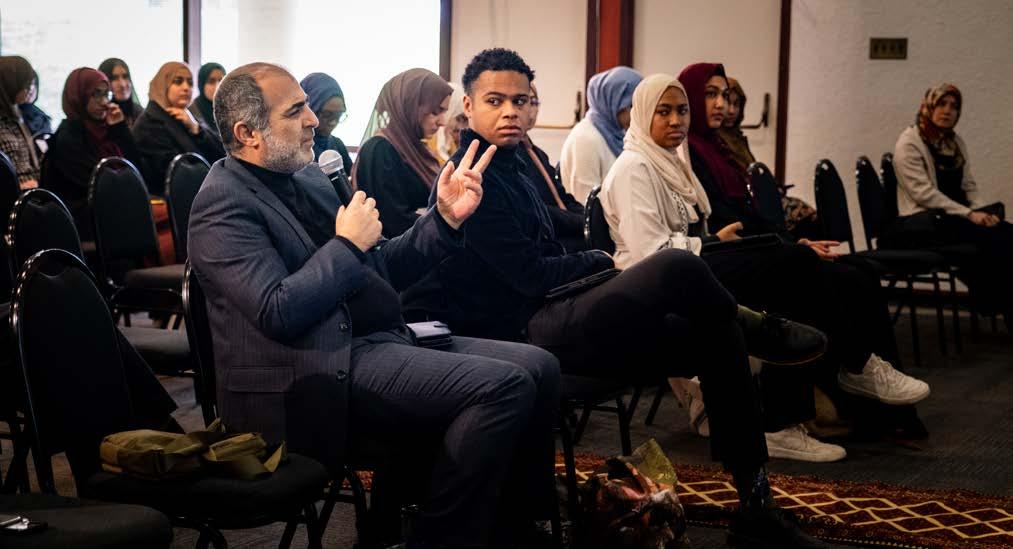
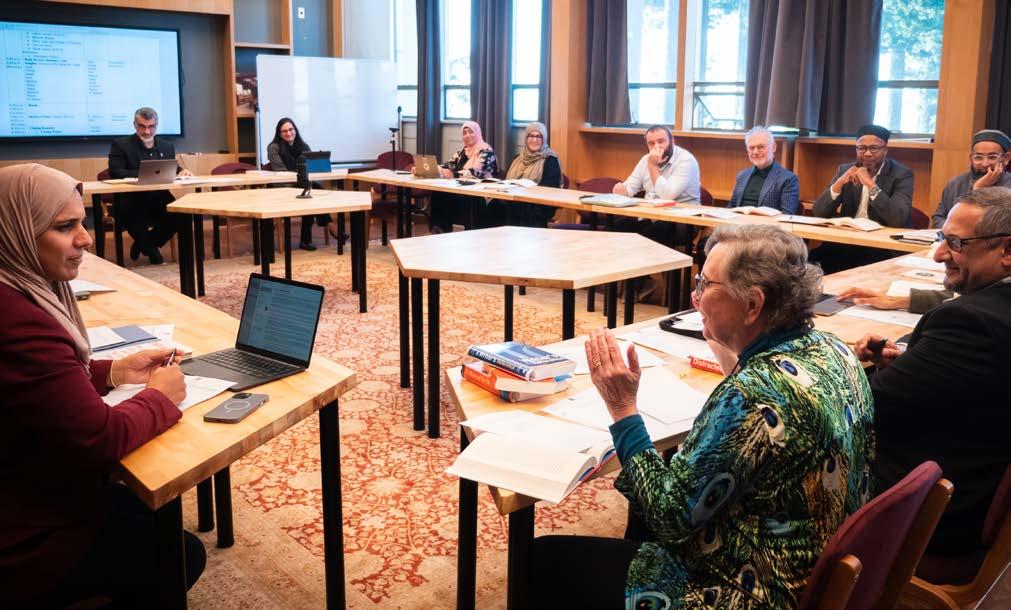
in t H e media
i n m arc H , a magazine in i stan B ul, Platform, interviewed Mr. Mahsuk Yamac, asking how Zaytuna College helps shape Muslim identity and how its graduates might be different from those of other colleges. Mr. Yamac told them that institution building is a “hallmark” for successful integration of minority communities such as the Muslim community in the United States. He emphasized the need for Muslims to understand the educational standards for the societies in which they reside as well as the Islamic tradition. “I envision and hope for colleges like ours to produce scholars, academics, and professionals in every field because they will meet the challenges of every sphere in which they are present,” he said.
In May, National Public Radio interviewed Dr. Abdullah Ali, a member of the Zaytuna faculty and an expert on Islamic law, for a story about the Taliban’s practice of stoning as a penalty for adulterers. Dr. Ali framed the existence of punishment by stoning as a “historical fact” in the Islamic tradition—but he emphasized that in Islam, proving
adultery is “almost impossible” and that most of those punished during the prophetic period actually confessed to the crime. The aim of any punishment is to serve as a deterrent and maintain moral order. “The fundamental goal of Islamic law is to manage society with balance to help the human being to form into a virtuous person,” Dr. Ali said. “And of course, by extension, society becomes a virtuous society.”
j ane a usten and t H e e conom Y of s alvation

In April, President Hamza Yusuf presented a webinar for the Classical Learning Test (CLT) on Jane Austen, titled “The Economy of Salvation in Jane Austen’s Sense and Sensibility.” He shared an uncommon exposition of Austen’s famed first novel through an anagogical analysis of her writing. Austen’s character design and plot development allow for a sophisticated commentary on the societal ills of the time, in particular the breakdown of social order from moral corruption. President Yusuf explains, “If there is not an economy of salvation of the worldly (the secular) and the otherworldly (the sacred), the worldly through a well-managed manor and the otherworldly through a well-managed parsonage, the community suffers and eventually breaks down.” President Yusuf, who serves as a board member for the CLT, previously presented a talk on Averroes, “The Commentator: Averroes and His Impact on the World.”
k no W Your t eac H ers Well
Teachers are often the least understood civic leaders in society, and an ambitious new initiative by Dr. Abdullah Ali aims to correct that, especially for Muslim teachers, by interviewing them in a podcast. Muslims in the West can learn about the lives, experiences, and educational journeys of many contemporary teachers responsible for creatively nurturing Muslim identity in their societies.
The new podcast, Talking with Teachers (also available on YouTube), is produced by Dr. Ali’s own project, Lamppost Education Initiative, in which he plays the role of a curious host as he interviews a wide range of teachers. Among his thirty guests have been established scholars, such
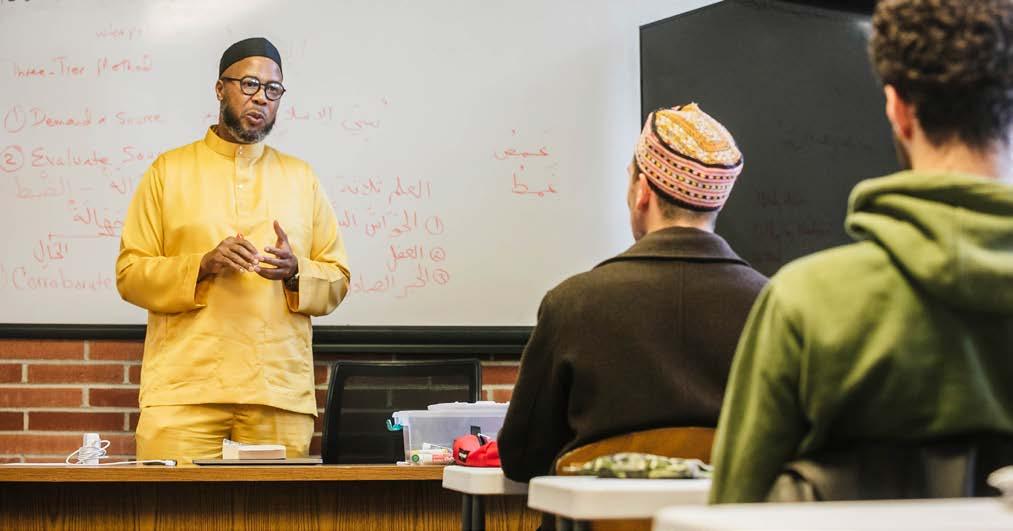
as Dr. Abdullah Hakim Quick, Dr. Sherman Jackson, and Shaykh Muhammad al-Ninowy, as well as emerging voices, such as Ustadh Mustafa Briggs, Shaykh Yahya Rhodus, and Ustadha Fatima Barkatullah
Dr. Ali probes the background of his guests—beginning each conversation with the question, “Who is [so-and-so]?”—as well as the details of their religious education. He closes by asking his guests to elaborate on the work of a teacher from the tradition, past or present, who inspired them in their journey.
“I feel that the more that the public knows about the personality of religious teachers, the more they can appreciate the individual and understand the context in which they are operating,” says Dr. Ali. “You’re never going to agree with everyone on everything, but it helps people gain an orientation of their understanding and their fundamental focus.”
cH asing t H e c rescent
Muslims have always directed their gaze toward the heavens, and Dr. Youssef Ismail, who teaches astronomy, geometry, calculus, and Maliki fiqh at Zaytuna, has conceived an instrument inspired by the Islamic tradition and facilitated by Silicon Valley tech culture. This year, he developed the first phase of a prayer-time application with a unique approach: the app will provide prayer times in accordance with how the Prophet Ş and his companions determined prayer times by using shadows, basing the calculations on an accurate astronomical model of the motion of the sun.
So far, he has produced a working website, optimized for mobile phones, that gives prayer times for any location worldwide, aids in determining the qibla for the given location, and shows times when prayer is prohibited. When he’s finished, the website will become a stand-alone phone app with even more features. The next phase of the app will help Muslims determine the start of a lunar month by incorporating the position and phase of the moon and will include probabilities for visibility of the new crescent moon.
Dr. Ismail is excited about his project but cautious that it’s often not easy to achieve congruence between astronomical observations, which are the basis of sacred law, and mathematical models. “Most of us use a cell phone today to check the time, and these are usually accurate,” he observes, “but we must make sure that we visually check, for example, that the sun is down, and that the gray band after sunset is visible in the east before calling the adhān for Maghrib. Mathematical models, while very powerful and accurate, need verification with real-world observation.”
c ontri B utions to s c H olars H i P
Members of Zaytuna’s faculty made distinctive contributions to scholarship in both Arabic and English language studies. Assistant professor of Arabic Dr. Esma Sag Sencal published a paper titled “The Influence of Modern Linguistic Approaches in the Contemporary Presentation of Naĥw: The Example of Al-Taţbīq al-naĥwī” in Cumhuriyet Theology Journal, a peer-reviewed journal published in Turkey. Dr. Sag Sencal wrote her paper in Turkish, but relied on English, Turkish, and Arabic

sources for her research. Fr. Francisco Nahoe contributed the chapter “Urbino Englished: Castiglione in Unfamiliar Clime” in the forthcoming Moralizing the Italian Marvellous in Early Modern England, published by Routledge. The volume explores Anglo-Italian cultural relations by analyzing a number of early modern Italian texts adapted into contemporary English culture. It is part of a series of books that seeks to place English dramatic tradition within the context of the Italian Renaissance tradition. Fr. Francisco’s chapter focuses on the work of Baldassare Castiglione, an Italian diplomat, solider, and author.
z a Y tuna f acult Y t ake s tage at isna
Imam Zaid Shakir and Shaykh Faraz Khan represented Zaytuna College at the 61st annual Islamic Society of North America convention, held in Dallas, Texas. Noted American public intellectual Dr. Cornel West offered remarks, along with a diverse cast of American Muslim religious and civic leaders. The theme of the weekend conference was “The Muslim American: Forging Faith & Action,” and many of the speakers addressed how Muslims in the United States could respond to the political and humanitarian crises that are plaguing the nation and the world. In a session titled “Embracing Faith Holistically,” Shaykh Faraz appeared onstage with pioneering North American Muslim leader Dr. Abdalla Idris Ali and Dr. Rania Awaad, a clinical professor of psychiatry at Stanford University School of Medicine. Shaykh Faraz emphasized the dangers of bifurcating our experience with the world as either religious or mundane. “Even outside ritual worship,” he said, “the world is full and replete with meaning. The Muslim is a person who discovers meaning and purpose constantly. There’s no such thing as a mundane action in the life of a Muslim.” Imam Zaid, meanwhile, spoke on a panel themed “Action Must Follow Faith,” directing the attention of the audience to the real consequences of our actions. “We’re not here to work for this world,” he said. “We do our best to improve the conditions of our fellow creatures, both humans and others. But we work for the hereafter. One who is intelligent understands this because one who is intelligent understands that this life in this world passes like the blinking of an eye.” Ð
“Even outside ritual worship, the world is full and replete with meaning. The Muslim is a person who discovers meaning and purpose constantly.”
s H a Y k H faraz k H an
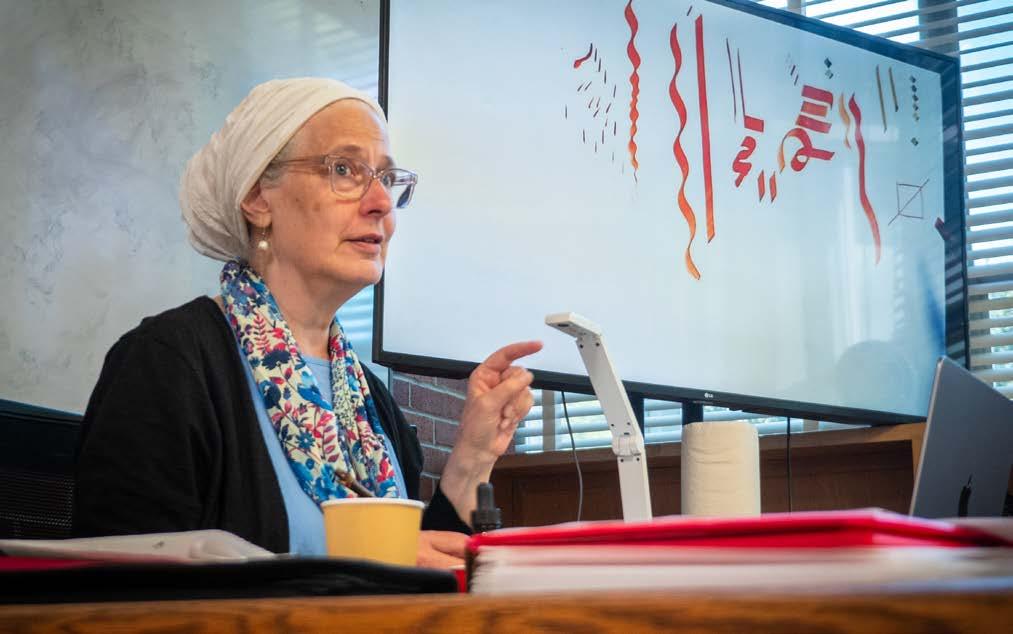
tH e c alligra PHY c lass
Elinor a ishah h ollan D sees H er art form as a natural part of a Zaytuna education—and not just because it cultivates the spirit but because it’s a kind of da‘wah, an inspiring invitation to learn the beauty of Islam. And just as a Muslim liberal arts college integrates Islam into American society, so does calligraphy implant Islamic beauty in our culture.
At Zaytuna’s summer Arabic term for rising freshmen and sophomores, Holland introduced undergraduates to Islamic calligraphy through the riq‘ah script of Arabic—a simple, elegant, and readable form. Her class—twice each week for seven weeks—offered students a respite from the intellectual rigor of learning the Arabic language. “Her class is a cherished time of stillness and serenity,” student Zayd Quadri recalled. For Zaytuna’s broader community, Holland also led two workshops and gave a public lecture. Holland prized pen and paper from an early age; when she visited Istanbul as a teenager, she discovered and fell in love with calligraphy
in the Arabic alphabet. She later received her ijāzah, or license, in two classical Arabic scripts from American master calligrapher Mohamed Zakariya. Now married to her art form for more than forty years, she exhibits, teaches, and does commercial and commissioned projects. Her clients include the Smithsonian Institution, the New York Public Library, the Metropolitan Museum of Art—and Zaytuna College.
While calligraphy is a precise art form, Holland teaches it with a playful spirit. Holding a pen aloft on the first day of class, she tells students: “I will help you learn how to play this instrument—but first you must forget everything you thought you knew about a pen and an alphabet.” She wants to make calligraphy accessible and demystify the art form. She was impressed by her students at Zaytuna. “I felt revived by their reception and enthusiasm,” she says. “Zaytuna College inspires me as a teacher, a calligrapher, and a human being.”
Practicing calligraphy, she says, is like daily prayer: sometimes transcendent, sometimes mundane. Along the way, the artist is transformed along with their script. “Calligraphy teaches me how to slow down and apply a light touch,” she says, “and that approach serves me well in other aspects of life.” At its best, calligraphy becomes an embodied way to engage with sacred text and to allow something holy to flow through one’s hand and into the world. In such transcendent moments, Holland recalls something a fellow calligrapher once said: We don’t do calligraphy for an ijāzah; we do it for our souls. Ð
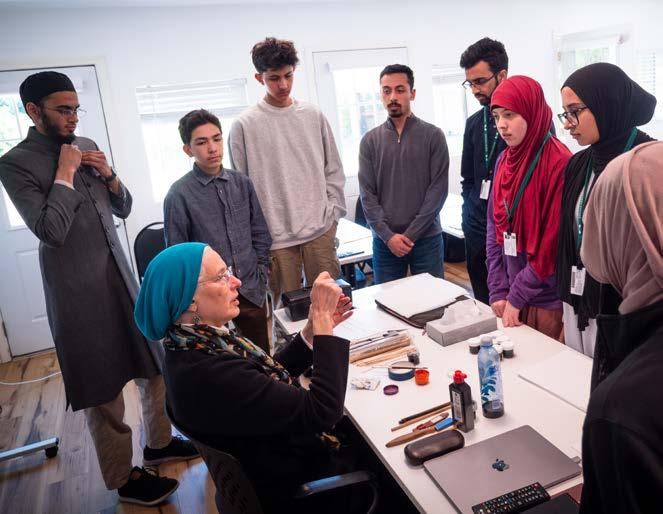
i f t H e ultimate aim of education is to inculcate love, beauty, truth, and goodness in a human being—to produce humane humans— the alumni of a college are the measure of its success. Zaytuna College has so far awarded degrees to more than 130 graduates. Most of them continued their educational journeys—in medical schools, law schools, seminaries, and PhD programs. Some pursued graduate or religious studies in other countries; some returned to pursue an MA in Islamic Texts. Zaytuna graduates have created nonprofit organizations, started families, published research, and developed curricula for schools. Long after they left Zaytuna, much of what they learned at the College seems alive and well within them.

Yusif Conn, Ba class of 2021, is in the Master’s in Public Health program at University of Texas Southwestern Medical Center.
“At the hospital pharmacy where I work, I’ve learned about the reality of American health care as opposed to the ideals I studied at Zaytuna, and it makes me want to further my medical career and contribute to health care reform. We have models in physicians from our past like Abū Bakr al-Rāzī, who gave generously of his time and his care, and never charged his patients. Our tradition affirms that the practice of medicine can be much more humane than what I have seen.”
Aasiya Sellars, Ba class of 2020, works as an on-call chaplain in Syracuse, New York.
“Given the unfolding crisis in Gaza, I was asked to do some spiritual triage work with sisters from the MSA at our local university. When I asked how they were understanding the situation, I discovered many students didn’t have access to the same spiritual and critical lenses I had acquired at Zaytuna. We were taught how to think logically about what we see in the news and to discern political persuasion through ethos, pathos, and logos. Alĥamdulillāh, I was able to help them consider different types of activism and different ways to speak up for our brothers and sisters, as well as different ways to think about these events as a spiritual test for ourselves and others. My Zaytuna education gave me valuable tools to navigate that conversation.”
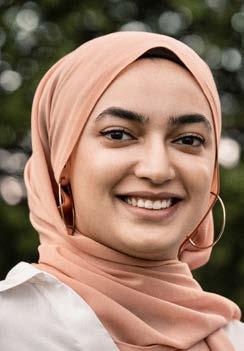
Yaseen Christian Andrewsen, Ba class of 2019, is a third-year doctoral student at the University of Oxford researching the Islamic intellectual tradition in West Africa.
“At Zaytuna, I acquired tools I needed to excel in academia, improving my writing and research skills. My exposure to different genres of Islamic thought makes scholarship more accessible and navigable to me here. I’m sometimes surprised by the presumptions of colleagues who never had such exposure. Also, many academics get excited by what they perceive as challenges to orthodoxy—but at Zaytuna I came to understand that differences of opinion are not unusual in Islam. There is a universal reason we are created to worship—but realizing the particulars of how that manifests in each individual is essential.”
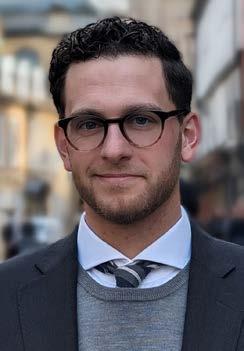
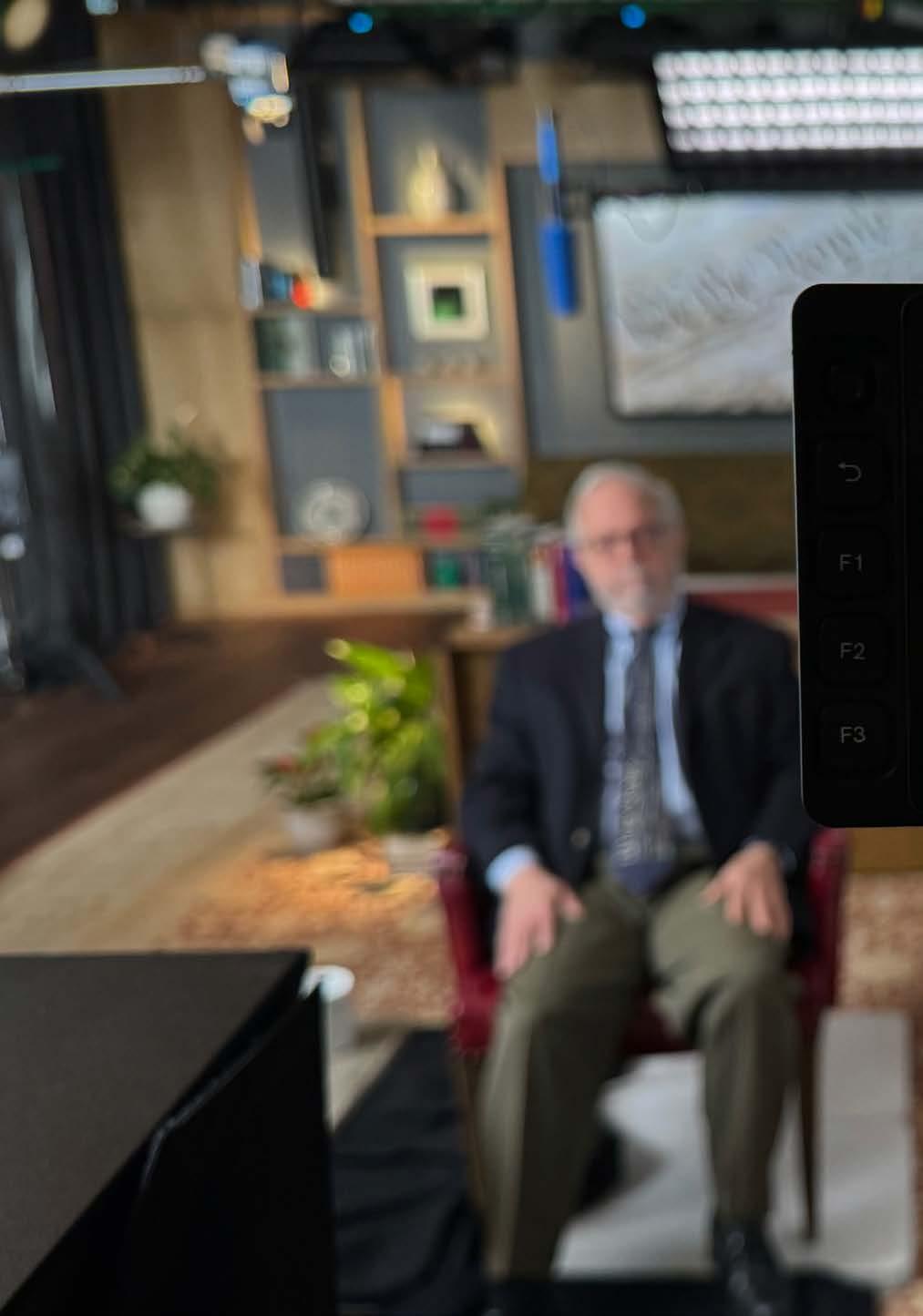

P u B lic engagement
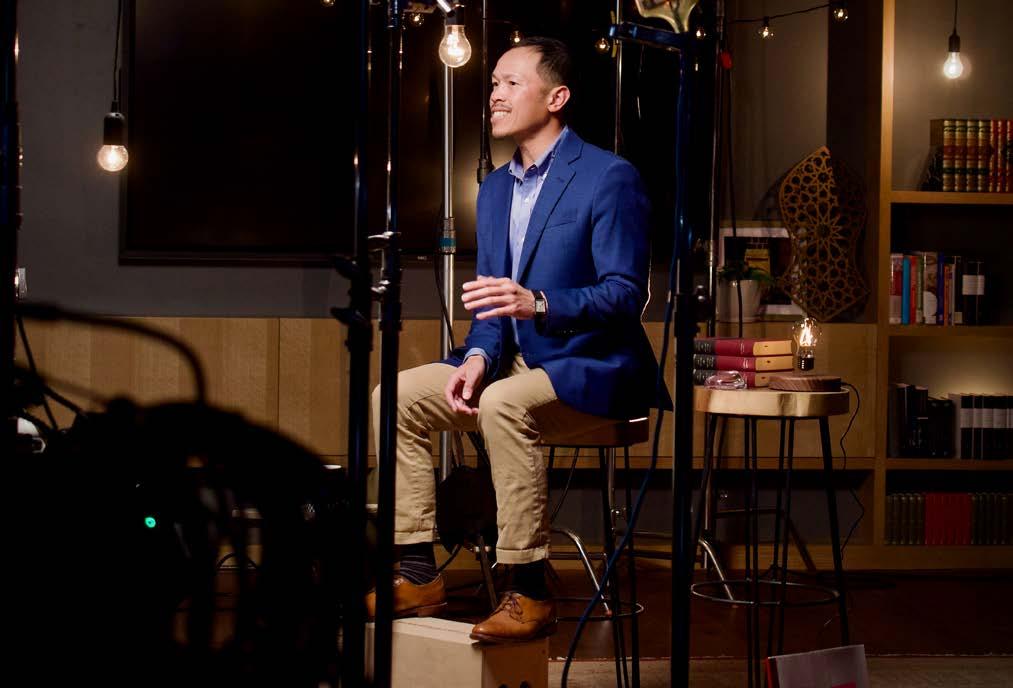
The first four courses of the Zaytuna College Online Courses program, presented here, have been recorded in the Zaytuna College studio and will be launched this winter. These varied courses reflect the scope of the College’s holistic curriculum, and more are in the planning stage.
i n t H is seven- P art class, Dr. Phillbert Cheng (ab0ve) seeks to make key concepts of his undergraduate course accessible to learners of all ages. Logic, he says, is relevant to everyone and has practical applications in everyday life. The only prerequisites for his online course are genuine interest, an ability to listen, and a willingness to read. Students will learn to order thought, make sharper distinctions, and deduce sound conclusions. They will acquire valuable tools to distinguish falsehood from truth.
Of course, one can reason well without studying logic; the ability to reason is part of our humanity. Dr. Cheng likens reasoning to running;
most people acquire the ability without formal instruction. Olympic runners, however, optimize their ability through technique, diet, and specialized training. Their athleticism bears little resemblance to someone running to catch a bus. In the same way, our reasoning capacity can be refined and significantly improved through the study of logic.
This twelve-part course, taught by Dr. Lawrence Jannuzzi (below), provides a first glance at the United States Constitution, its creation, its structures, and its goals and aspirations. One may ask why a Muslim college would teach this course. The answer is simple: Islam is heir to a long tradition of thought and contemplation on the nature of human beings and on our relationship to God and other humans. That is the stuff of society and governments, and it is exactly what the US Constitution deals with and attempts to set forth. Perhaps more important, what the Islamic and constitutional traditions have to say to each other is as crucial a conversation for Muslim life in the United States as it is for Americans of all traditions and backgrounds. By the end of this course, students will acquire familiarity with the Constitution—its strengths and its weaknesses, its successes and its failures, and, above all, the challenges it faces today as it comes under unprecedented stress. This familiarity and understanding are vital to any person interested in our society and in where the document fits into the bigger picture, both in history and in the world today.
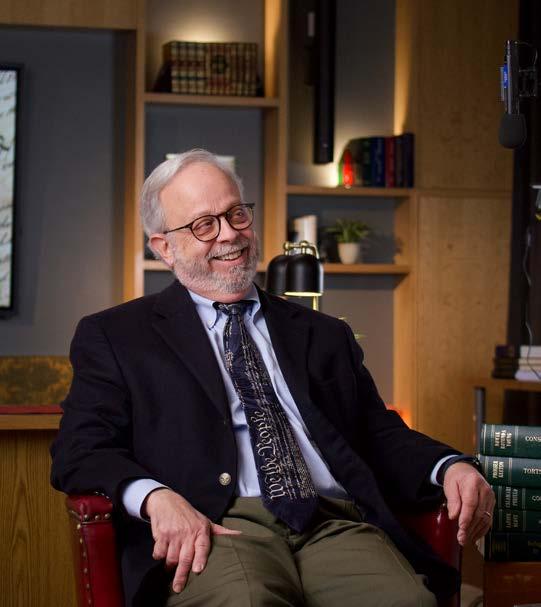

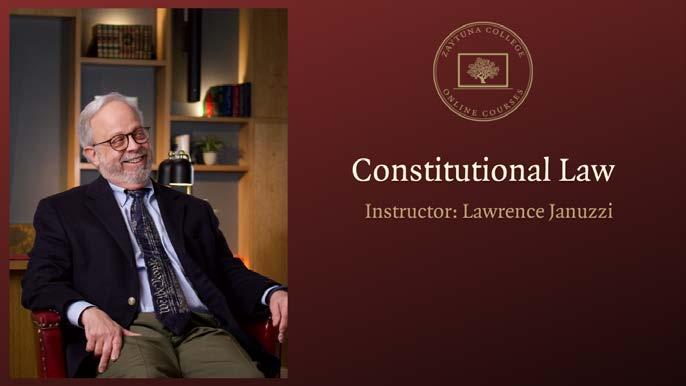
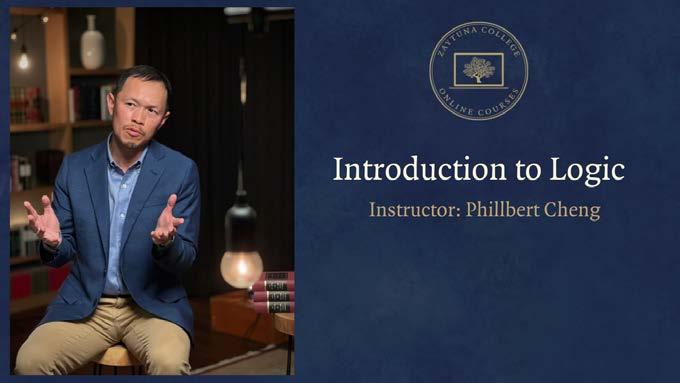
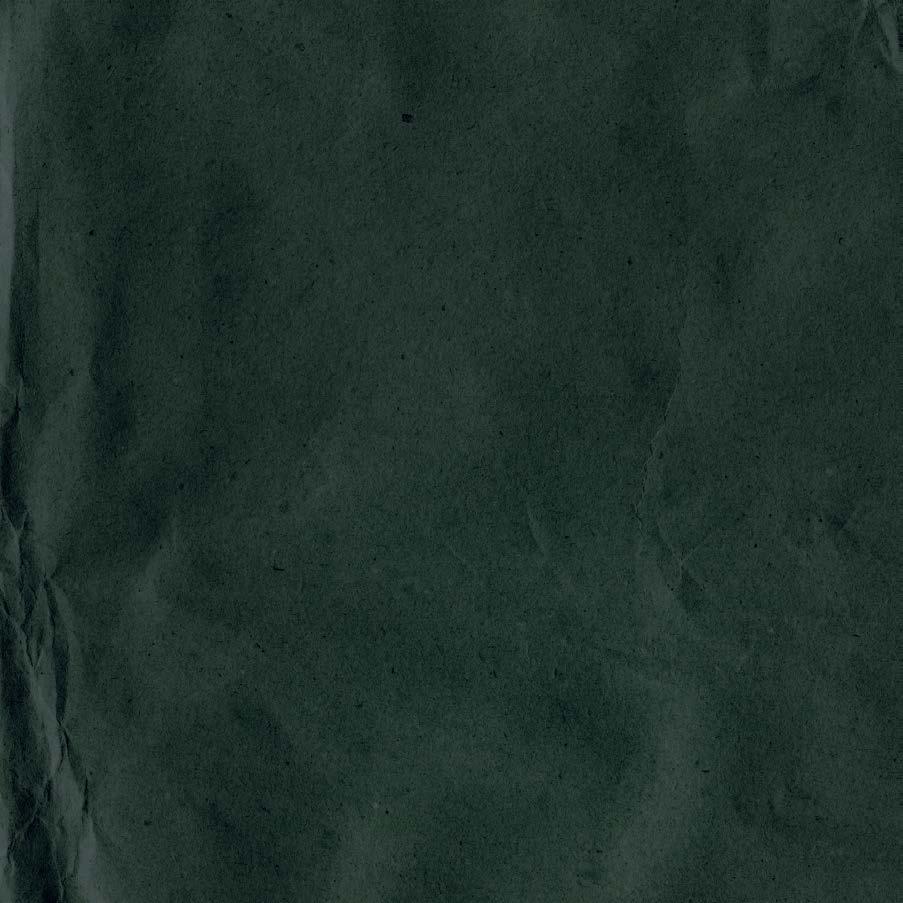
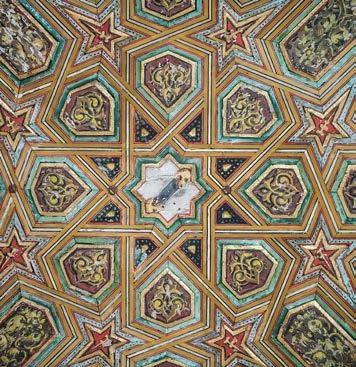


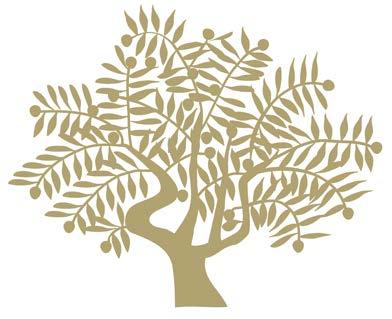

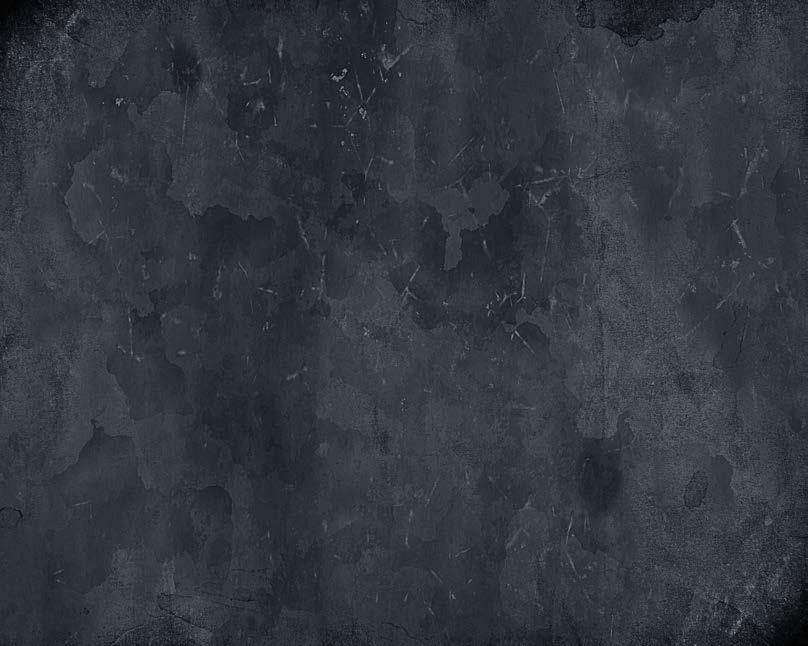

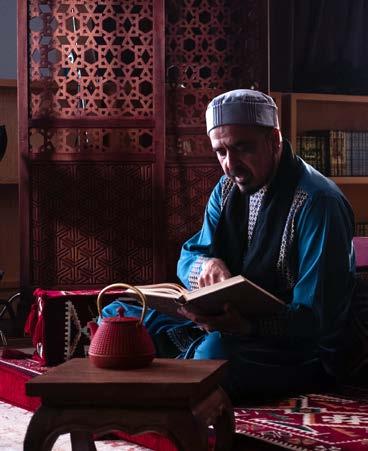


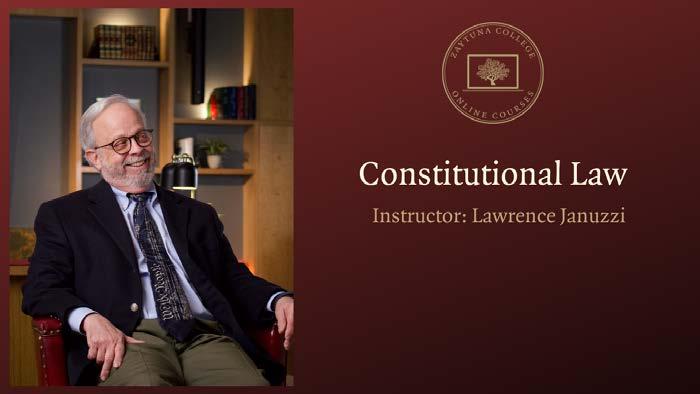

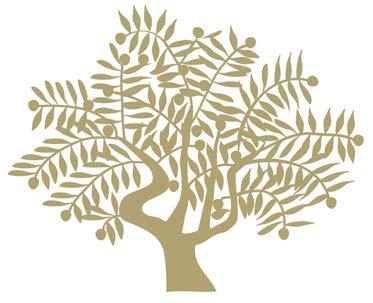



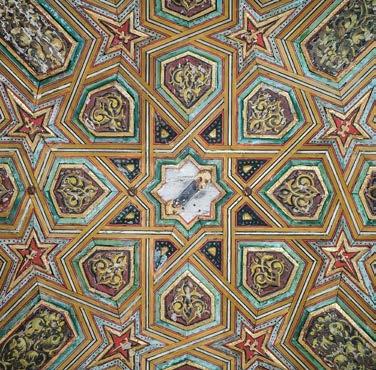



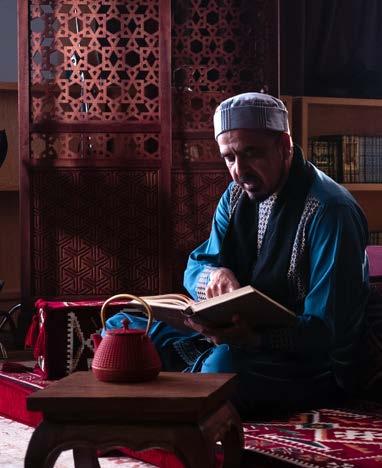
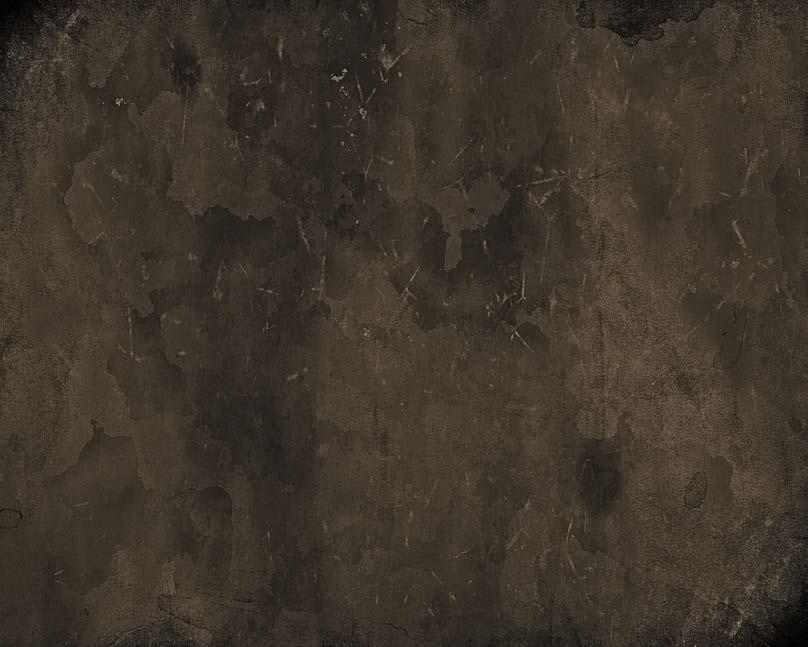
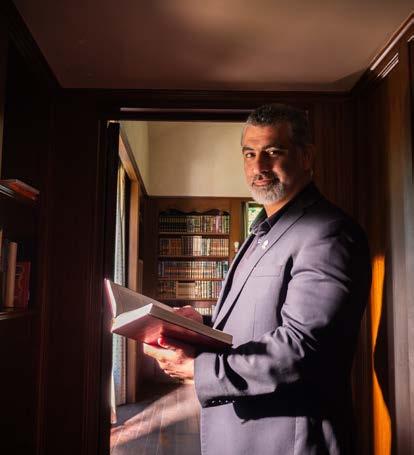
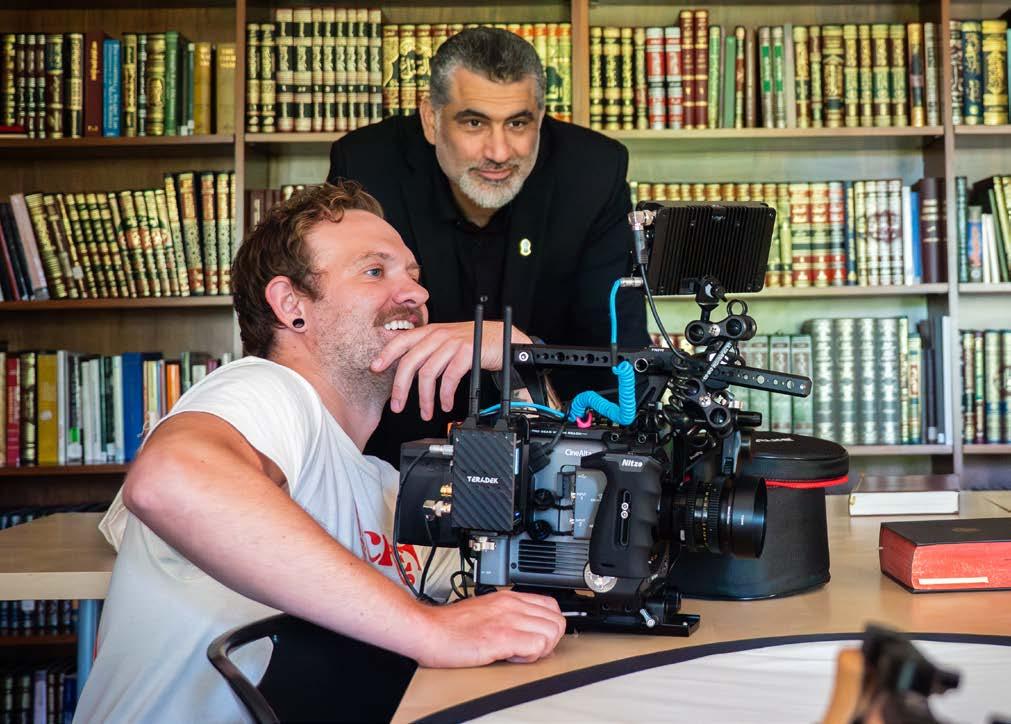
In this online course, taught by Dr. Ali Ataie (above), students dive into the fascinating world of Jewish theology. By the end, students will be able to describe the most salient features of Jewish theology. Among the many benefits of studying comparative Abrahamic theologies are that it increases one in knowledge and certitude and gives one the confidence to engage in substantive religious discourse by finely tuning the three operations of the mind—apprehension, judgment, and reasoning— with respect to various theological concepts.
Viewing the world through theologically oriented interpretive lenses provides greater insights into the human condition, which leads to an increase in empathy, compassion, altruism, and mercy. That, in turn, helps align one’s character with the noble character traits of the holy prophets and messengers. Such adherence of one’s character to the character of the Prophet Muhammad Ş specifically is the key to capturing divine love as evidenced in the Qur’an: “Say: If you love God, then follow me (in order that) God might love you.”
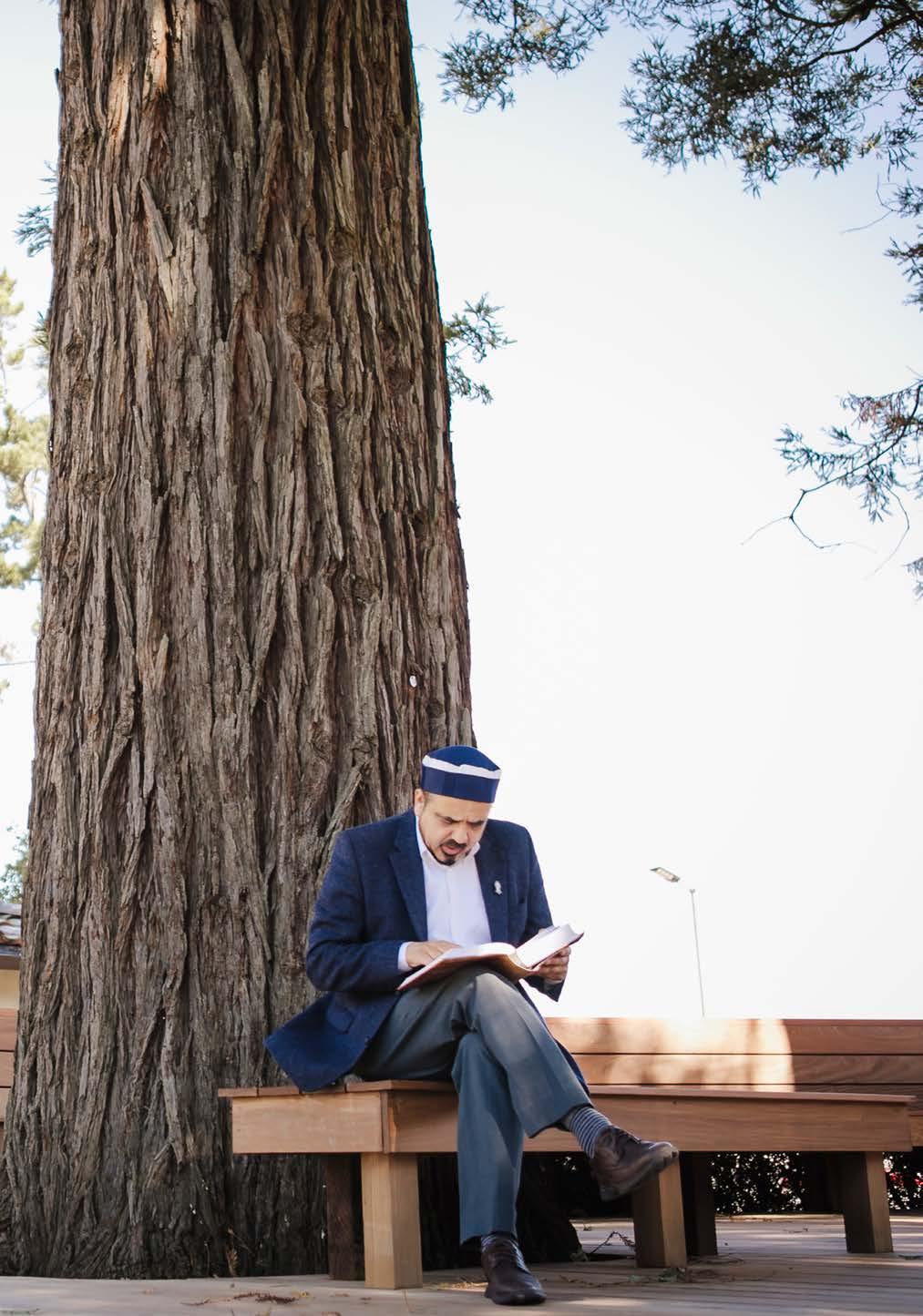
“I had a thousand desires, but with the one desire to know You, all others melted away.”
rumi
How did a man named Jalāl al-Dīn Muĥammad al-Balkhī—more commonly known as Rumi—a turbaned theologian and Hanafi jurist from the thirteenth century, become the world’s bestselling poet, so beloved that UNESCO declared 2007 the International Year of Rumi? What lies within the poetry of this Islamic scholar that continues to resonate within people’s hearts to this day?
To understand the answers to this question requires teachers who do not merely impart knowledge but transmit their passion for the subject to their students. It would be hard to find an instructor more passionate about his subject than Ustadh Feraidoon Mojadedi (left) teaching Mawlānā Rumi. To complete this Zaytuna online course about Rumi’s masterwork is to experience the power of poetry that ignites the heart as well as the intellect.
Named after a contemporary Persian poet, Ustadh Feraidoon seemed destined from childhood to fall in love with verse; his family in Herat, Afghanistan, often split into two teams for impromptu poetry competitions—one side recited a poem, while the other side had to recite one that began with the last letter of that poem. The secret to winning, his older brother told him, was to memorize as many poems as possible. And Ustadh Feraidoon has been committing poetry to memory ever since.
“My early dedication to memorization was all about the nafs [ego],” he acknowledges, recalling his intense desire to win the family game. The Masnawī, he says, is about the nafs. Its seemingly simple stories teach us to gain mastery over our incessant desires, self-centered obsessions, and unbridled passions—all of our lower impulses that lead us astray and become barriers that prevent love from flowing freely in our hearts.
“I had a thousand desires,” Rumi wrote. “But with the one desire to know You, all others melted away.” Awareness of those desires, and of how to melt them and turn to God, Ustadh Feraidoon says, is the core idea of the ten-session online course.
Throughout the twenty-six thousand lines of the Masnawī, Rumi tells the story that interests us most of all: our personal story. No matter our culture, religion, politics, or class, we find ourselves: Where do we come from? Where are we going? How can we live in peace with ourselves and others? What is our response to suffering? Answers to these and other existential questions are hidden in Rumi’s verses—and Ustadh Feraidoon aims to help students find and contemplate them. Ð

tH e stee P drive u P to z a Y tuna c ollege ascends through a densely populated Berkeley neighborhood of large, picturesque homes before the road ends at the campus gates. To pass through them is to enter into a serene and spacious sanctuary. During the blessed month of Ramadan, the campus is conducive to a celestial state of mind and heart, even as it grounds us and invites reconnection with the rhythms of nature.
This year’s Ramadan began at Zaytuna with a moon sighting—an exhilarating experience for faculty and students alike. “We welcomed Ramadan with a celebratory spirit I previously associated only with Eid,” says Jaohara Mahamood, a first-year MA student from India studying Islamic law. Earlier, President Hamza Yusuf wished the Zaytuna community a month of physical, spiritual, and social healing— and prescribed a daily dose of Qur’an as part of a remedy for what ails us. He urged everyone to turn away from distraction and toward our Creator and make the most of these sacred days when the gates of heaven open wide.
tH e s tudent e x P erience
For students there was abundant encouragement to experience a restorative, transformative Ramadan. With suĥūr and iftar provided by the College and enjoyed in community, with illuminating daily classes grounded in the Islamic tradition, and with nightly tarāwīĥ prayers
throughout the sacred month, students immersed themselves in daily study and nightly devotion. Some days, that meant waking to a gentle knock on their door and a whispered invitation to read from the Qur’an before fajr. Other days, it meant showing up in the dorm kitchen sleepyeyed at 5:00 a.m. to find an earlier riser already spooning shakshouka onto plates or pulling a tray of warm croissants from the oven to serve to her sisters. “Even before Ramadan began, we came together to set our intentions and goals and plan how to help one another meet them,” recalls Lyba Hussain, a senior from the Bay Area.
In the morning, melodious sounds of Qur’an drifted out from classrooms as students practiced their recitation. Each evening a few students led tarāwīĥ prayers, and their fellow students listened closely. One night, between prayers, the muśallā was empty except for a few students seated on the plush red carpet, their heads bowed over thick Arabic texts propped open on wooden book holders. In this month of renewed devotion, students are often reminded that studying is one of the highest forms of worship.
Among the Ramadan events was a session of the First Command Book Club, with President Yusuf engaging Dr. Nasrin Rouzati, author of Trial and Tribulation in the Quran: A Mystical Theodicy, in a conversation about suffering in our tradition. “In Islam, suffering is not a problem to be solved; it is an opportunity,” said Dr. Rouzati, whose textual analysis of the Qur’an reveals why the problem of evil—among the most debated issues in the Euro-American philosophy of religion—is not an issue in Islamic civilization. On another evening, in a lecture on Persian poetry, Ustadh Feraidoon Mojadedi explained Rumi’s provocative metaphors and explored the sublime but sometimes subversive poetry of Hafez after reciting it in its original Persian.
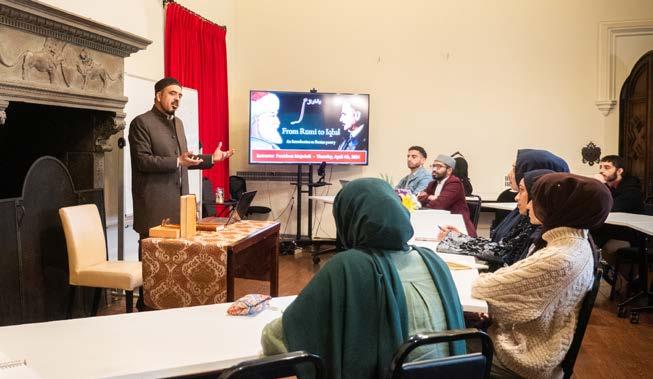
“In Islam, suffering is not a problem to be solved; it is an opportunity.”
d r. n asrin r ouzati
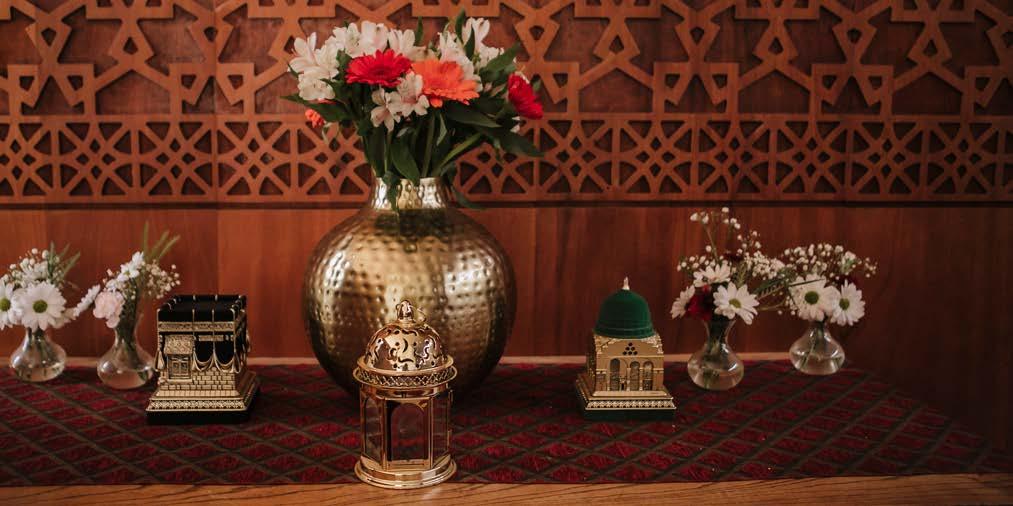
c ommunit Y e ngagement in r amadan
During the month, Zaytuna offered the community two weekly lecture series on Islam’s scriptural tradition: a comparative analysis of revelation and a study and reflection on the words and deeds of the Prophet Ş
Dr. Ali Ataie, the dean of undergraduate studies and a scholar of the Qur’an and comparative theology, offered a weekly online series on Ramadan and revelation. His first three talks—on the Torah, Psalms, and Gospels—laid the foundation for his final one, which presented the Qur’an, detailing its confirmations and corrections of the previous dispensations. He addressed the Qur’an’s uniquely plausible historical claims, its reconciliation of reason and revelation in contrast to biblical narratives, and its masterful linguistic subtlety—all signs that point to its divine origins. The Qur’an accurately predicted it would become and remain the gold standard of Arabic literature; this singular text of the Arabic literary tradition remains an inimitable masterpiece that arguably has had a greater impact on civilization than any other book.
President Yusuf’s weekly teachings on Mukhtasar Śaĥīĥ al-Bukhārī by Ibn Abī Jamrah, which were livestreamed from the muśallā to include our global community, offered a thoughtful examination of selected hadith collected by Imam al-Bukhārī. Beginning with an overview of the scholar’s life and the science of hadith collections, President Yusuf went on to explore key events, relationships, and teachings from the life of the Prophet Ş
“Real fiqh is to give people ease from a sound source,” President Yusuf said in his final talk, in response to a question from an MA student in the law track. “Whatever goes from mercy to harshness is not Islam.”
He concluded his talks by returning to four hadith that scholars have agreed are most essential and contain everything Muslims need to know about the sunnah.
a sP ecial v isit from i mam z aid
Professor emeritus Imam Zaid Shakir returned to a campus community thirsty for his presence, his piety, and his prudential advice. He joined the young men for suĥūr in their dorm and offered one-on-one consultations and personal dua for students who requested academic guidance. “The beauty of Imam Zaid,” one student said, “is that he follows the prophetic approach to guidance. He meets us wherever we are, and he engages us as companions.”
Imam Zaid also offered a talk to the campus community, expounding on the hadith about the seven who will stand in the shade of God on Judgment Day, and he exhorted students to increase their love and respect for one another, to give generously and elevate their spirits, and to race to worship God during their precious and fleeting youth.
Speaking to students, faculty, and the local community in the final days of Ramadan, President Yusuf urged them to sustain and deepen their relationship to the Qur’an, reminding them that the best dhikr is recitation of the Qur’an. Reading and reciting is not enough, he added; deep contemplation and reflection is essential. “Take your learning as far as you can,” he said. Addressing students directly, he said, “Hopefully from among you we will get serious scholars of this religion.… Mashallah, some of you are better readers than I was at your age. Inshallah, if you are serious, you will go very far. But you have to do the work.” Ð
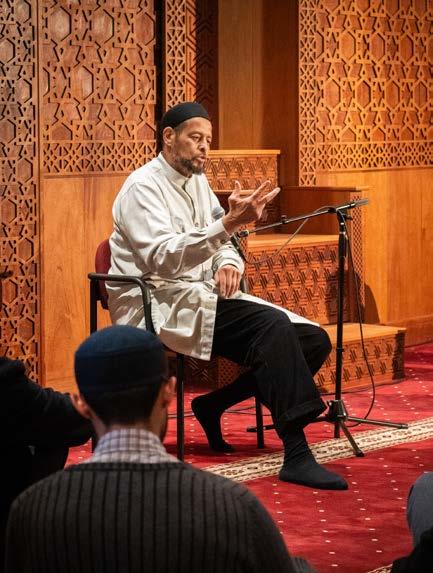
Imam Zaid Shakir speaking with students during his Ramadan visit
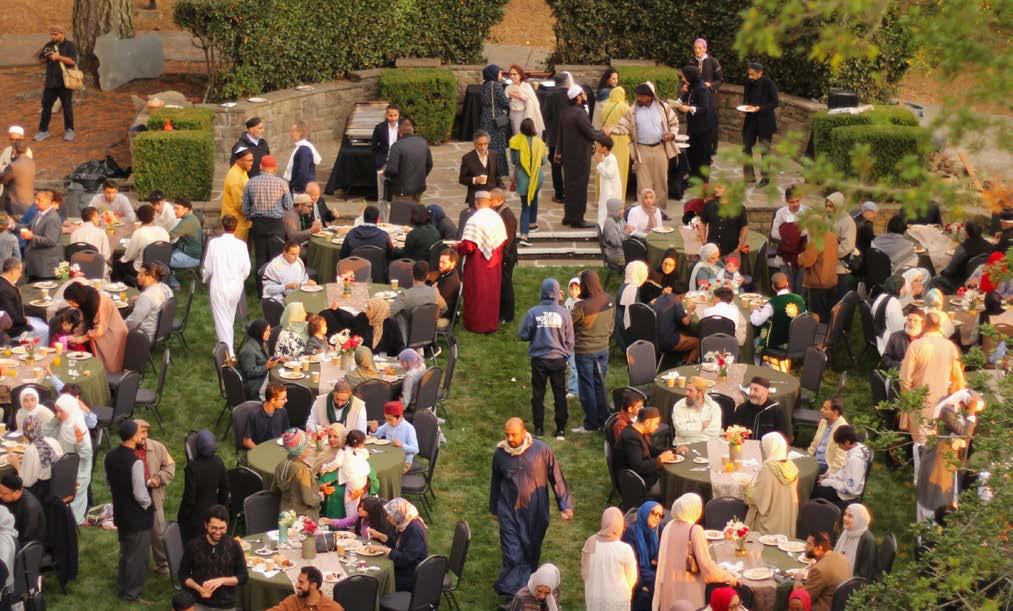
r a B i al- aWW al
It is reported by Abū Hurayrah that the Messenger of God Ş said, “There is no disease that Allah has created, except that He has also created its treatment.” (al-Bukhārī)
God promises that no soul will leave this world without having endured suffering. “We shall certainly test you with fear and hunger, and loss of property, lives, and crops; but give good news to those who are patient” (Qur’an 2:155). But just as our Creator tests us with afflictions, through His infinite mercy He also provides their cures, the greatest of which manifest in the life, practice, and teachings of His Beloved, the Prophet Muhammad Ş.
For Rabi al-Awwal, the birth month of our Prophet Ş, Zaytuna College chose the theme the Medicinal Messenger Ş to celebrate the Prophet’s perfect example, which offers healing for our hearts, minds, and souls through an online video series featuring faculty and other teachers and a special Mawlid program on Zaytuna’s campus with President Hamza Yusuf and hundreds of San Francisco Bay Area supporters.
In Prophetic Prescriptions for the Brokenhearted, Ustadhah Hosai Mojaddidi offered prophetic practices to aid in healing mental and spiritual
ailments. In Healing through the Natural World, Ustadh Rhamis Kent shared prophetic wisdom for cultivating the earth and connecting with the natural world. And in Restoring Reason in an Unreasonable Age, Dr. Ali Ataie explored what made our Prophet Ş the best and most impactful teacher of all of humanity.
Dr. Ataie reflected on the prophetic statement “I was only sent as a teacher.” The word for teacher in Arabic, mu‘allim, literally means “one who makes an impression,” he explained, and the greatest teachers change the course of their students’ lives.
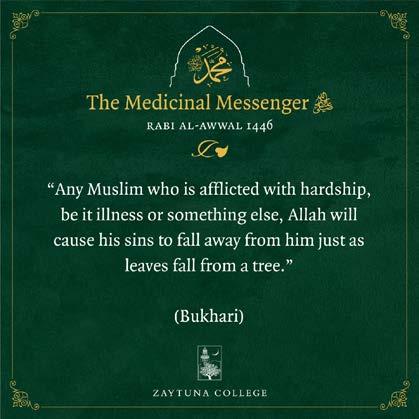
The Prophet Ş was deeply committed to the acquisition and dissemination of knowledge, and he lived a disciplined, theocentric life. He taught by embodied example. He was transparent, honest, sincere, and reliable.
His systematic and gradual teaching method engendered a longing for additional knowledge rather than a sense of being burdened or overwhelmed. Wise and practical, he often repeated himself for the benefit of his companions. He was gentle, easygoing, and approachable—and he recognized the wisdom and insight of other traditions.
These qualities and more, Dr. Ataie said, inspire Zaytuna faculty in their teaching. “Striving for iĥsān is at the heart of Zaytuna’s mission,” he said. “We hope for our alumni, as muĥsinīn, to extend beauty and excellence into the world.” Ð
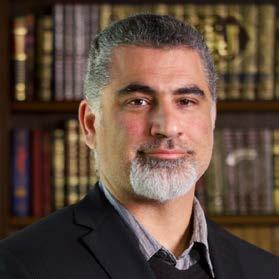
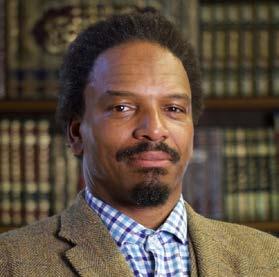
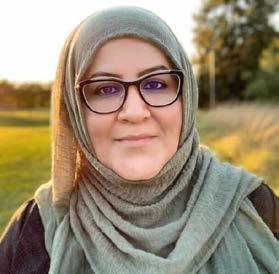
And your Lord inspired the bee, “Make your houses in the mountains, in the trees, and in the buildings they construct. Then eat from all the fruits, gently walking the pathways of your Lord.” From within them exudes a drink of various colors, in it healing for humankind. Surely in that is a sign for people who reflect.
( q ur’an 16:68–69)
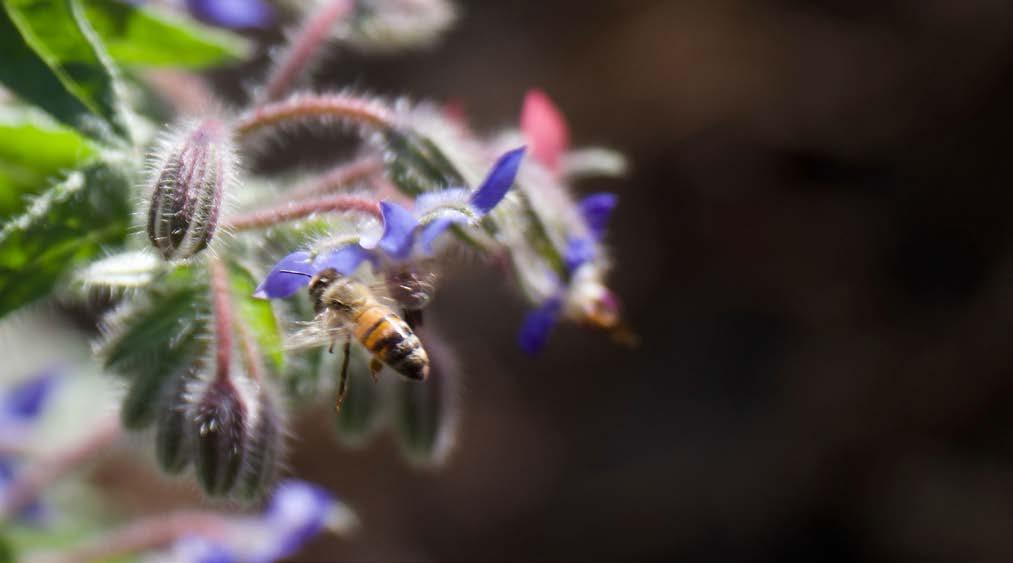
tH e z a Y tuna c enter for e t H ical l iving and l earning
i n H is a P artment in e g YP t many years ago, Mohamad Rassoul dreamed of farming. So shortly after purchasing his California home in 2009, he started raising chickens and soon acquired three goats. Then he became a beekeeper, learning from the internet all he needed to know—including how to build his own hives. And the first time the bees moved into the hives, Mohamad was struck with wonder. He has been a beekeeper ever since.
He arrived at Zaytuna after Rhamis Kent, resident permaculture design instructor at Zaytuna’s Center for Ethical Living and Learning (zcell), realized he needed help revitalizing and expanding the permaculture garden’s beekeeping initiative—and called Mohamad.
Mohamad offered to help Rhamis acquire more bees to help pollinate the garden and orchard at Zaytuna’s upper campus. First he purchased sixty thousand bees from a Yemeni beekeeper in Oakland. Then he picked up two large hives and brought them to Zaytuna. A month later, the bees began to swarm—a good sign. It meant the original colonies were reproducing and clusters of bees were leaving to start a new colony. One day, when neighbors found a swarm on a tree in their yard, Rhamis
P resident’s re P ort 2024
and his students walked over, cut the branch, and carefully transferred the swarm into a box.
On his first visit to Zaytuna, Mohamad found two ailing hives. Now there are bees buzzing in a dozen hives. Beekeeping on a college campus is not as unusual as it seems—Mohamad says it complements students’ classroom learning. Just as studying increases their wonder and devotion, so does contemplating God’s signs in nature. That’s what Mohamad loves about beekeeping: reflecting on the miracle of God’s creation, known in Arabic as tafakkur. And, of course, the honey!

Bees are wondrous to observe. They’re adept at collaboration; tens of thousands behave as a single organism. Together they heat and cool the hive. Each one has a task—and is born knowing how to do it. Bees communicate through dance and vibration, guiding one another to food or away from danger, and they exist for our benefit and to support their next generation.
“From within them exudes a drink of various colors, in it healing for humankind. Surely in that is a sign for people who reflect” (16:69). But distractions get in the way of introspection. Tafakkur, Mohamad says, is an ‘ibādah many Muslims have lost in our fast-paced and frenzied modern era. In simpler times, when there were fewer disruptions and distractions to preoccupy the mind, people pondered nature. These days we must commit to slow down and spend time in nature. Beekeeping and other outdoor interests lead to new understanding and appreciation of God’s creation.
“If we have everything we need,” Mohamad observes, “we become oblivious.” New interests require new learning. Everything he learns is connected—and all of it increases his wonder. “The Qur’an is our revealed book,” he says, “And we also have the Book of Life, or the cosmos. How do we learn to read it? We go out in nature, and we notice all that God has created for our amazement, and so we might know Him.” Ð


“We all need beauty—even if we don’t know it.”
“ m ake a merica B eautiful,” President Hamza Yusuf urged in a recent address at Zaytuna College. Muslims were once known for the beauty of their architecture, language, clothing, poetry, adab, and more. In countless ways, Khadija Annette O'Connell strives to bring iĥsān to her work—in the past, she created warm and welcoming settings for special events and now she curates beautiful and useful products for the Zaytuna bookstore.
To call it a bookstore is a little like calling an iftar a meal. In addition to a singular selection of books for readers of all ages, the store offers much more to delight the spirit and senses: naturally scented candles from the United Kingdom, handmade rugs from Tunisia, handbound Qur’ans made by a Syrian refugee in Turkey, and more. Each choice is informed by her sense of quality, equity, and utility, along with her intention to live simply and reduce waste.
Khadija has been inspired to create beauty ever since she was a girl growing up in Alaska and arranging wildflowers into bouquets to decorate her home. She discovered early on how beauty can lift people’s spirits and alter a space. She began work at Zaytuna as a volunteer in
the nineties. It was a hopeful time, she recalls, working with others who were discovering the heart of Islam.
“We all need beauty—even if we don’t know it,” she says. From a secular perspective, it is physical or material—but for Muslims, beauty is linked to action or behavior. Ihsan is goodness that is inseparable from beauty, or beautiful action, which the Qur’an repeatedly calls humanity to do: “Do what is beautiful, as God has done what is beautiful to you” (28:77).
Khadija is more comfortable creating beauty than having a conversation about it—because beauty, she says, is intuitive, not intellectual. Our hearts recognize and respond to it. For her, its key aspects include intention, simplicity, nature, and light. For one special event, she placed a few Monstera leaves in a glass vase on each table to welcome guests. To make visitors to her store feel welcome, she tries to find treasures at every price point, so struggling students and successful professionals can each find something delightful and affordable.
Lately, Zaytuna’s bookstore has been exclusively online because of an ongoing renovation project at the College’s lower campus. But soon, a new storefront will open in the Le Conte building, in a bigger, brighter space with tall windows. With cozy couches for reading, with illuminating texts for readers of all ages, or simply with sunlight streaming in and a smile on her face, she intends to create a space where people linger to appreciate goodness and beauty. Ð

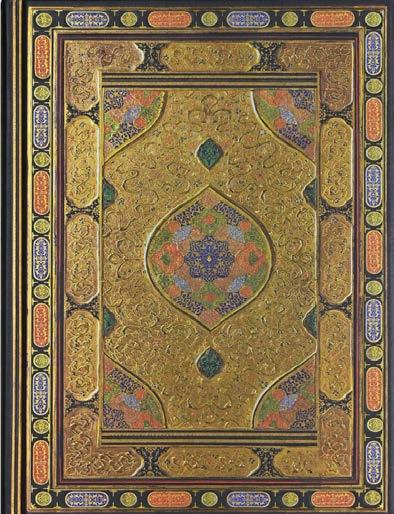
Readers of the First Command Book Club read and discussed the following books in 2024. All First Command Book Club books are available at the Zaytuna Bookstore: bookstore.zaytuna.edu
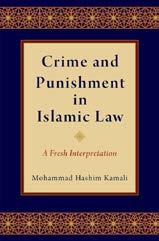

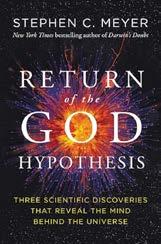
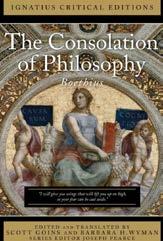
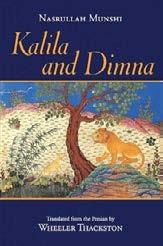
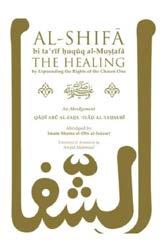

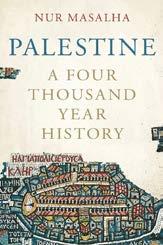

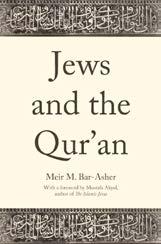

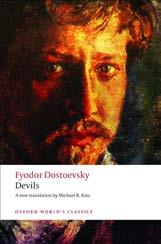
tH roug H out 2024, t H e H undreds of readers and supporters of Zaytuna College who attended the online sessions of the First Command Book Club hosted by President Hamza Yusuf were treated to interactive livestreamed sessions of a curated selection of books, with other authors and scholars joining President Yusuf for many of the sessions.
The noted expert of Islamic philosophy Dr. Peter Adamson joined President Yusuf for a conversation on his book Don’t Think for Yourself: Authority and Belief in Medieval Philosophy. The book sheds light on the concept of taqlīd, or uncritical acceptance of authority, and Dr. Adamson said he wrote it to counter assumptions about medieval cultures as being inordinately careful or reluctant about innovation and creative progress. “In the early period of Islam, taqlīd was a negative concept, more of a disparaging remark,” Dr. Adamson pointed out.

In another session, Dr. Stephen Meyer, a renowned Cambridge-trained historian of science, joined President Yusuf to discuss his book Return of the God Hypothesis: Three Scientific Discoveries That Reveal the Mind Behind the Universe. The work represents his rejoinder to the outdated notion that science and faith are locked in an intractable battle. Faith, he said, doesn’t require the rejection of scientific empiricism, which originated from the work of religious (not materialistic) scientists who took God’s creation seriously.
“I think a productive science depends on a rational empiricism, combining the two,” Dr. Meyer said. “We want to bring our ability to reason, to deduce mathematical reality from simpler mathematical first principles, but we want to bring that to bear on the analysis of nature.
That means we also have to observe nature. We can’t just deduce what nature must be. We have to see what it actually is.”
Other guest appearances included historian Dr. Khalid Blankinship; Dr. Kent Hill, cofounder of the Religious Freedom Institute; Dr. Nasrin Rouzati, author of Trials and Tribulation in the Qur’an; and Turkish intellectual Mustafa Akyol. Zaytuna vice president Dr. Aisha Subhani cohosted many of the sessions with President Yusuf, and Zaytuna faculty—Dr. Ali Ataie, Dr. Abdullah Ali, and Shaykh Muhammad Boufares—also participated in some sessions.
The book club, composed of Zaytuna’s burgeoning 12000 Strong community of monthly supporters, meets online each lunar month. President Yusuf selected this year’s books from multiple traditions, periods, and genres, such as Dead Souls, a sometimes comical but profound nineteenth-century Russian novel; Nuclear War: A Scenario, a vivid journalistic account of what could happen in the event of a nuclear strike; Kalila and Dimna, a twelfth-century Persian version of an enduring set of classical tales providing lessons on the art of leadership; and Jews in the Qur’an, a book examining the depiction of Jews in the Muslim tradition, as well as the community’s influence on the tradition.
Other selections included an interpretation of Islamic criminal law that encourages a fresh reading of shariah to revitalize the application of the law in the modern world; a classic from the Middle Ages that articulates the true end of life—knowledge of God Ű—through an extended conversation between the author, an imprisoned government official in the Roman Empire, and Lady Philosophy; and a probing exploration of the purpose of divine trials in the Islamic tradition.
Note: The First Command Book Club is an interactive livestream series hosted by President Hamza Yusuf and is open to members of the 12000 Strong monthly supporter program, who get reading guides to the books, a Zaytuna College Bookstore discount, and access to videos of all session recordings. Those wishing to join can sign up as monthly donors here: zaytuna.edu/givebookclub. Ð
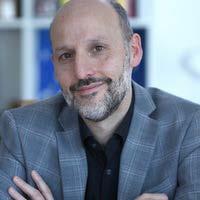


In an age rife with moral conundrums, we continue to publish books that may help guide our community to rise to challenges through effective language, rigorous logic, and prophetic character, with three key titles nearing completion. Perhaps the most anticipated of these is The Hamziyyah of Imam al-Būśīrī, a translation and introduction by President Hamza Yusuf of a masterpiece of Arabic poetry in praise of the Prophet Ş by the celebrated author of the Burdah. Additional forthcoming titles are two texts from the Zaytuna Curriculum Series: The Criterion of Knowledge in the Art of Logic, a translation and commentary by Shaykh Faraz Khan of Imam al-Ghazālī’s text on the method of systemic thinking and reasoning; and Badhl al-ma‘ruf, a useful Arabic-language publication for students outlining the meanings, uses, and linguistic import of Arabic prepositions.
tH e Hamzi YY a H : i ntroducing an a ra B ic m aster W ork f rom P remodern times on, great poetry has moved hearts and souls across civilizations. Imam al-Būśīrī excelled at praise poetry that attained a global reach because he praised the Prophet Muhammad Ş with the Burdah and the Hamziyyah, two sublime poems that occasioned countless commentaries over centuries explicating their eloquence and linguistic subtleties.
Born and bred in Egypt in the thirteenth century, Imam al-Būśīrī has been aptly described as “the scholar of the poets, and the most poetic among the scholars, the most eloquent among the orators, and the most erudite among the sages.” He studied prophetic biography and comparative religion, both of which inform the Hamziyyah. His epithet, reflecting a life of service to Islam, was Sharaf al-Dīn (“Faith’s honor”).


The Hamziyyah of Imam al-Būśīrī An Ode in Praise of the Best of Creation s translation and introduction
Substantial parts of the Hamziyyah cover the Prophet’s life, his historical period, and the miracles that attended him. The poem also addresses the miracles of the Qur’an, a vivid story of the medieval voyage from Cairo to Mecca and Medina, a critique of Jews and Christians, and an
president’s report 2024
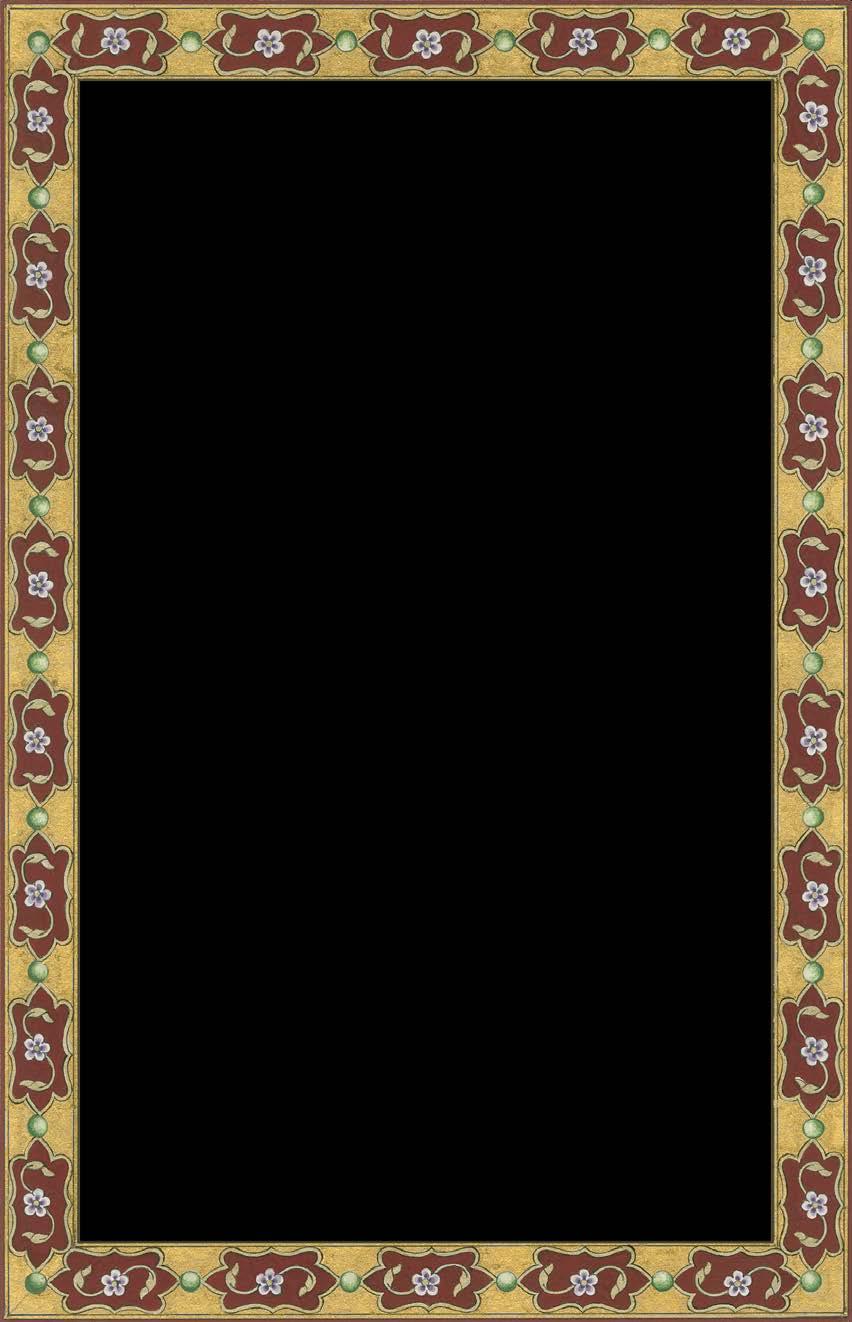


5. You possess the essence of what is knowable of the unseen beyond the names Adam knew.1
the nobility of god’s emissary’s lineage


6. Esteemed fathers and mothers—an unbroken line— were chosen for you from the cache of creation.


7. No period passed between emissaries of God but prophets told their people of your time.


8. All prior ages boastfully vied for you: each era surpassed the prior due to its proximity to you,
introspective look at the poet’s own past deeds and misdeeds.
Imam al-Būśīrī had a burning love of God and God’s final Messenger Ş, a love expressed with such beauty that it still continues to resonate within hearts all across the world.
Born and bred in Egypt in the thirteenth century, Imam al-Būśīrī has been aptly described as “the scholar of the poets, and the most poetic among the scholars, the most eloquent among the orators, and the most erudite among the sages.”
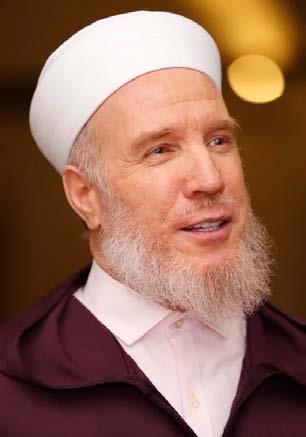
Praise for t H e t ranslation
“The highest level of eloquence any Arab can reach inheres in Arabic poetry: thus, poets in later generations invariably expressed their love for the Prophet Ş in marvels of poetry that poured forth from their tongues and pens like pearls. Undoubtedly, the most famous of the praise poets is Imam al-Būśīrī. Having lived with al-Būśīrī for over fiftyfive years of my life, listening to the Burdah and Hamziyyah sung in weekly gatherings, and having cast two poetic expansions of both, I can say that Shaykh Hamza Yusuf’s work today deserves praise and celebration.”
— Shaykh Muhammad al-Yaqoubi, from the foreword
Imam al-Būśīrī deployed the power of his pen to convey his burning love of God and God’s final Messenger Ş so that his poems might ignite that love in the hearts of future readers. More than a millennium later, we find ourselves in desperate need of that same sentiment. May this poem help us to become the beneficiaries and the inheritors of that sublime love of the Beloved of God, Muhammad Ş.
Hamza Yusuf, from t H e i ntroduction

i n 1967, an a merican general W rote, “Ours is a world of nuclear giants but ethical infants.” Half a century later, our world of technical giants remains in its ethical infancy. Individualistic, materialistic, and utilitarian ethical frameworks used to regulate new technologies are insufficient protection from the pervasiveness and processing power of artificial intelligence. How might Islamic ethics inform the development and use of AI?
This September, Zaytuna College explored this question on its upper campus at the Ethics, AI + Islam Summit, which it cohosted with partners GMW, Collective Continuum, Deen Developers, and LaunchGood. “I felt a part of a historic moment,” said LaunchGood founder Chris Blauvelt about the conference. “The technology realm needs ethical leadership, and the value Islam can bring to these conversations remains untapped. I hope these conversations continue—not just for the benefit of the Muslim community, but for the sake of the whole world.”
The conference brought together Muslim scholars and students, including members of Zaytuna’s faculty and student body, thought leaders, and leaders in AI technology for a day of unprecedented conversations. Dr. Ali Ataie gave a talk on the intersection of AI and religion.
President Hamza Yusuf joined Google director Faraz Ahmed and MA student Omar Al-Naggar for a panel discussion. Zaytuna faculty member Dr. Harun Sencal also participated in a session.
Omar, a former robotics engineer, also gave a presentation on how Islamic law and ethics might inform the development and regulation of AI. In contrast to other ethical frameworks, he said, Islamic ethics considers societal as well as individual needs, and it weighs potential consequences beyond a human lifetime. The Islamic mandate to preserve the intellect and its faculties goes beyond discouraging the use of intoxicants; it also prohibits manipulation, deceit, ambiguity, and influence.
“The technology realm needs ethical leadership, and the value Islam can bring to these conversations remains untapped. I hope these conversations continue—not just for the benefit of the Muslim community, but for the sake of the whole world.”
c H ris B lauvelt
This could inform the development of persuasive AI, which uses data mining to manipulate decision-making. Islamic ethics, which protect the most vulnerable, would require prohibiting AI’s exploitation of those who are most easily influenced. Ð
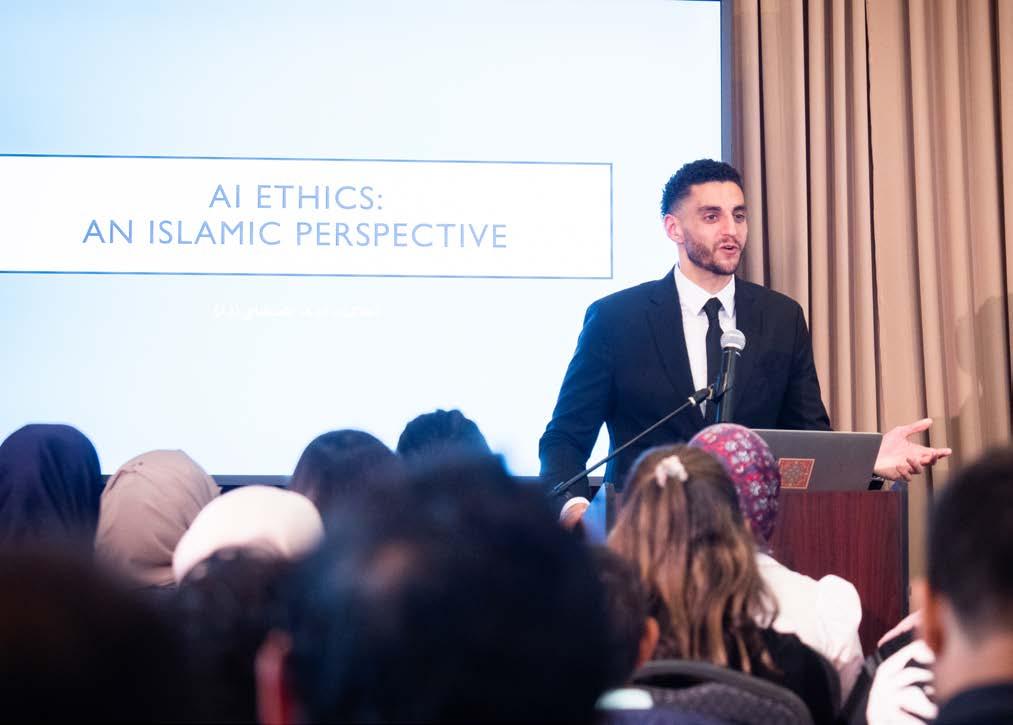
Zaytuna welcomed upward of three hundred people to its campus for its annual Zaytuna Day, an event in which supporters took tours of the college, attended sample classes, experienced Zaytuna outside the classroom through archery and the permaculture garden, and heard talks from College leadership.
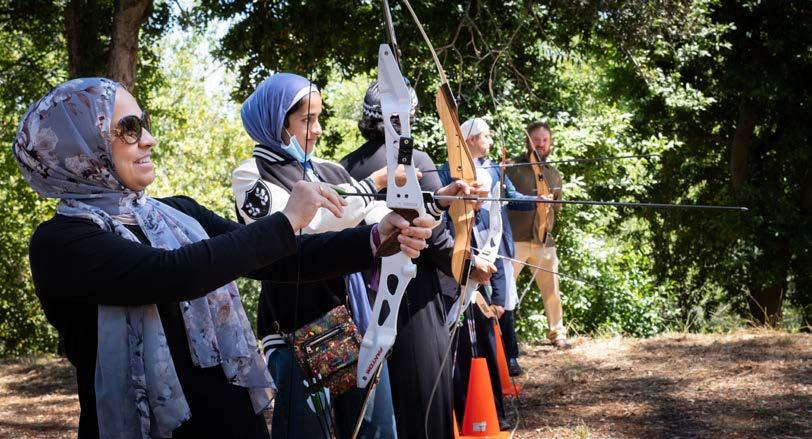

i n j une 2024, z a Y tuna c ollege launched its newest and forthcoming publications and hosted sold-out events at the Bradford Literature Festival, the largest literary conference in the United Kingdom, which brings together authors, artists, scholars, and thinkers from around the world.
Dr. Aisha Subhani, vice president of the College, and research fellow Dr. Asad Tarsin joined President Hamza Yusuf for a panel discussion of the Great Books tradition in Muslim and Western civilizations. This panel also served as a book launch for the two latest releases from the Zaytuna Curriculum Series, The Combinatorial House of Wisdom and Book of Letters. “It was heartening to witness the great support and excitement for the Curriculum Series, which we hope to expand with new publications in the coming year, inshallah,” says Dr. Subhani.
Ustadh Feraidoon Mojadedi (right) moderated a discussion between President Yusuf and Professor Abdullah Alkadi on Dr. Alkadi’s pioneering work in the field of prophetic biography, Places of Revelation. Ustadh Feraidoon also delivered a talk titled “Rumi and Iqbal: Divine Love.”

In a presentation chaired by Ian Abdal Latif Whiteman, and with accompaniment by the renowned Fes Singers of Morocco, President Yusuf presented his upcoming translation of Imam al-Būśīrī’s Qaśīdat al-Hamziyyah, the first complete English rendering of this thirteenth-century ode to the Prophet Ş. Though lesser known than al-Būśīrī’s Qaśīdat al-Burdah, this unique panegyric of 456 verses may be a greater literary accomplishment.
“It was moving to see that, at Britain’s biggest literature conference, President Yusuf’s events were the most widely attended,” said Dr. Asad. These events, held in the main auditorium, which seats hundreds, sold out shortly after tickets were made available. Ð
report 2024

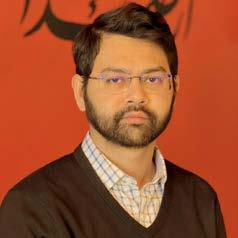

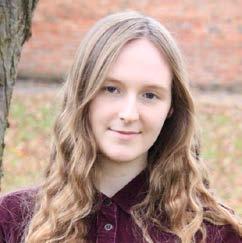
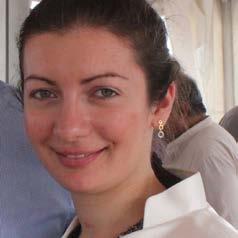

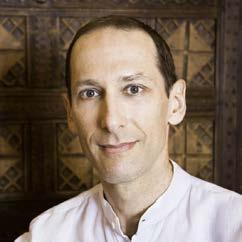





k ee P ing to its founding vision, Renovatio writers tackled modern challenges in 2024 from AI and transhumanism to human consciousness and suffering, from murderous wars and the idolatry of nationalism to global warming and nihilism.
With the failure of assorted ideologies that sought to provide a totalizing system for modern society, a new—or, in reality, old—form of meaning-making is emerging among intellectuals. Recent books invoke degrees of polytheism or pantheism as a metaphysical approach to repel the rising tide of nihilism. Could this represent an opportunity for traditional monotheism?
In his essay in Renovatio’s Spring 2024 edition, Shaykh Faraz Khan observes that prophetic moments in history were often preceded by polytheism, from the graven images that the Ten Commandments rejected to the 360 idols that occupied the Kaaba before the Prophet Muhammad’s mission. “When idols emerge in a society,” he writes, “the God of monotheism manifests with intensity and clarity; light shines most brightly in the dark.”
Other essays address the fields of AI and neuroscience, written by Dr. Mark Delp and Dr. Muhammad Faruque, respectively. Dr. Carl Trueman examines how technology has become a new theology that defends a transhumanist future, while Dr. Rosabel Ansari breaks down the climate crisis through an Avicennian paradigm. In light of ongoing wars in Gaza and elsewhere, Renovatio writers also tackled the sanctity of innocents: Dr. Juan Cole wrote on the value of a single life in Islam and Judaism, and Dr. Asma Afsaruddin on military ethics in Islam. These articles point thematically to Renovatio’s second issue of 2024, on war and peace, featuring essays by, among others, Dr. Andrew March, on whether a state has a moral right to exist, Dr. Hina Khalid, who explores the poet Muhammad Iqbal’s ideas on revolution, and Chris Hedges, on the immorality of civilian deaths in wars. First-time writers in the Fall issue include historian Dr. Khalid Blankinship, former journalist and sociologist Dr. Jonathan Lyons, scholar of religion Dr. William Cavanaugh, and American Muslim lawyer Asma Uddin.
In addition to publishing two issues in 2024, Renovatio unveiled a new way to engage its essays: through the Audio Essay. Selected essays by the publication’s growing roster of writers are read by a handful of carefully curated readers with fitting voices to record them, in the manner of high-quality audiobooks. Ð
Wit H t H e recent release of t W o videos about Ibn Khaldun, the Emir-Stein Center has produced some of the final intellectual contributions of British historian and novelist Robert Irwin, who passed away in June.
In the video Ibn Khaldun, the Philosopher of Ruins, released a few weeks before Irwin’s passing, he explains how Ibn Khaldun’s life and thought fit into his historical and intellectual context, including his ideas on medieval Islamic theology, philosophy, politics, literature, economics, law, and tribal life.
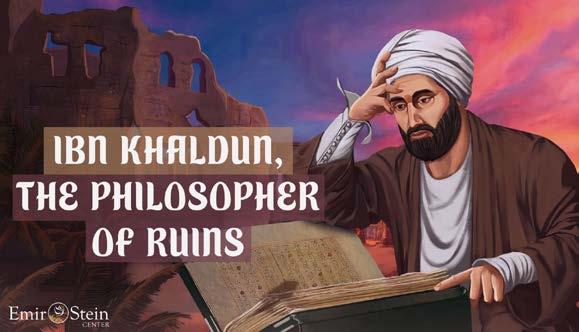
Because Ibn Khaldun’s ideas often seemed to anticipate by centuries developments in many fields, he is often depicted as more of a modern man than a medieval one, credited, for instance, as the “Father of Economics” or as a supporter of “supply-side economics.” Irwin’s account of such misreadings in the second video, Ibn Khaldun and Islam: Victims of Orientalism?, provides new insights about the history of Orientalism.
“Ibn Khaldun was not trying to anticipate Laffer and Reagan,” Irwin explains. “He was instead trying to match the moral prescriptions of the Qur’an and such Muslim thinkers as the theologian, jurist, and Sufi al-Ghazālī. The greatness of Ibn Khaldun can be fully realized only when he has been placed in his correct Islamic context.”
The pair of videos were among five that the Emir-Stein Center produced this year. Two of the other titles are Why Did Columbus Equate Muslims and Native Americans?, based on Dr. Alan Mikhail’s book God’s Shadow: Sultan Selim, His Ottoman Empire, and the Making of the Modern World, and Why We Can’t Ignore the Bible’s Violent Verses, written and narrated by Dr. Philip Jenkins. Ð
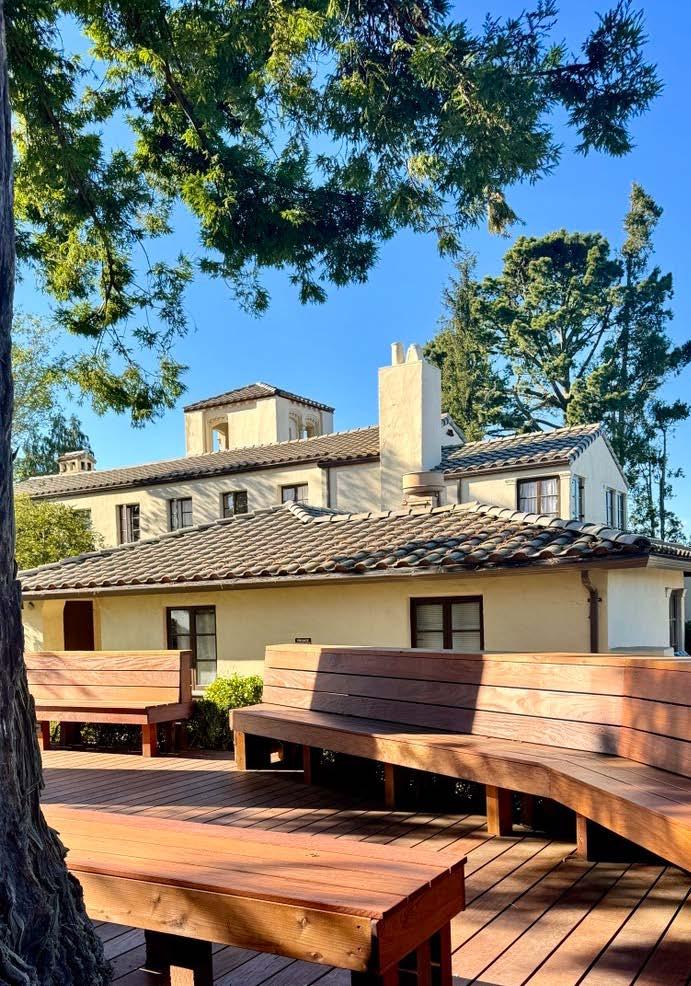
college o P erations
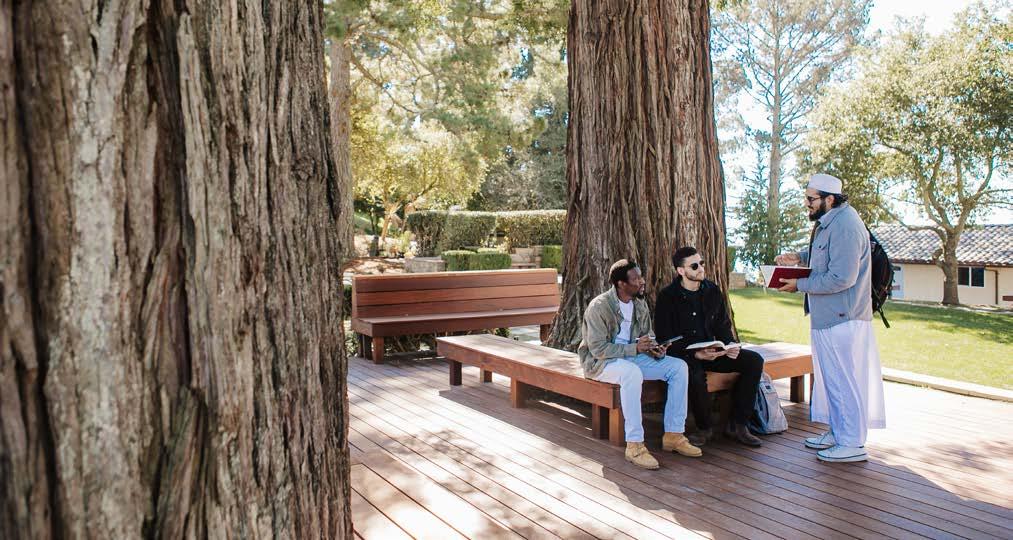
n e W Pro P erties and uP grades
W H en Jacobus b otha , director of facilities and campus support services, arrived at Zaytuna in 2015, the College leased two buildings for student housing several blocks from another rented building where classes took place. Faculty and staff struggled to find housing in one of the most expensive areas of the country, often enduring long commutes to reach the College. Mr. Botha never imagined the astonishing growth he would witness over the next nine years or how such inexplicable abundance would touch his heart and transform his work.
“If you don’t believe in miracles, come to Zaytuna,” Imam Zaid Shakir once said—and Mr. Botha agrees. During his tenure, Zaytuna acquired a serene nine-acre campus atop a Berkeley hill and purchased four faculty residences and a complex of nine apartments for faculty and staff housing. Today six faculty members and ten staff members reside in College housing, and three more units are used for visiting scholars and guests.
In 2024, Mr. Botha saw even more growth, with new properties and major renovations. The College acquired a building near the lower campus from the Graduate Theological Union, which is being renovated to create much-needed office space. On the upper campus, a residence just beyond the College’s gates now provides needed housing (besides the on-campus dorm) for undergraduate women.
This year saw another major acquisition. By the grace of God, and with financial support from a handful of donors, Zaytuna acquired a stunning seventeen-acre plot a few minutes from the upper campus. Plans for that location include facilities for the sunnah sports of swimming, horseback riding, and archery, as well as a retreat center for community education programs, God willing.
“Zaytuna College has been blessed beyond my ability to imagine,” says Mr. Botha.
The blessings are not lost on Dr. Aisha Subhani, vice president of the College.
“Zaytuna’s growth is first and foremost from the limitless generosity of our Creator, and then from our stalwart supporters, who have given us their precious trust in fulfilling this lofty mission.”
“In recent years we have witnessed incredible growth with exciting plans to expand and improve our offerings as a college and institution committed to excellence in learning,” she says. “This growth is first and foremost from the limitless generosity of our Creator, and then from our stalwart supporters, who have given us their precious trust in fulfilling this lofty mission. May God accept from all of us.”
The new property requires significant attention. The first step is to bring it into compliance with wildfire regulations. Then the former horse facility’s standing structures—sheds, stables, arena—need to be cleared of trash, weeds, and overgrowth. After the cleanup, property development will take place in three phases: build the Haq Aquatic Center and Ansari Sports Center for students; build more staff and student housing; and finally, build the retreat center to host gatherings for people of all ages for public workshops, educational courses, and conferences.
dr. ais H a su BH ani A rendering of the
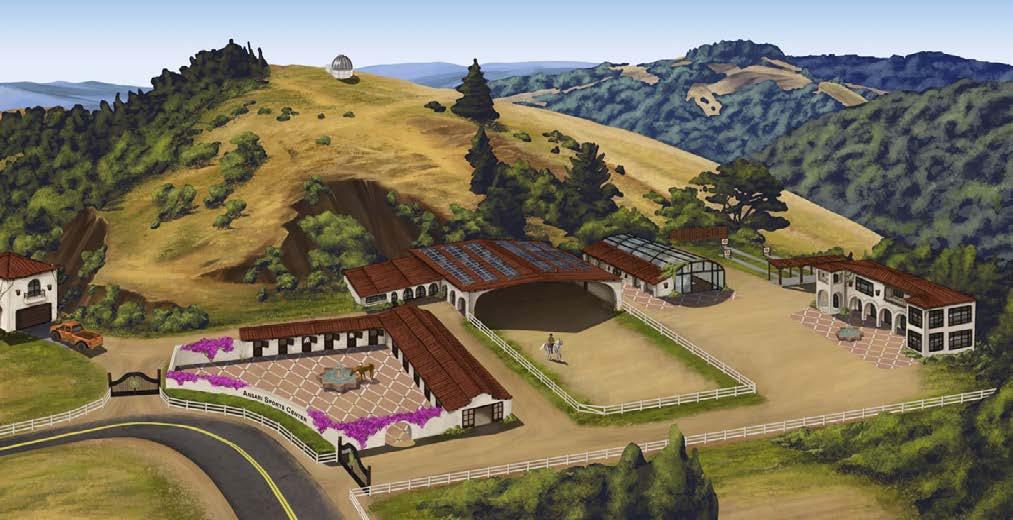
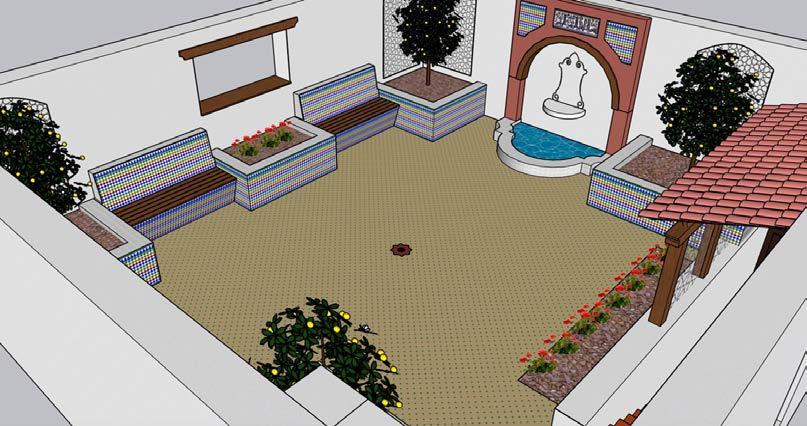
Meanwhile, Mr. Botha and his facilities staff are making steady progress with renovations and upgrades on both the lower and upper campuses. For the Kajani Gardens adjacent to Sophia Hall on the upper campus, they resurfaced and extended the flagstone patio, created new garden beds and stonewall seating areas, and built a spectacular twelvehundred-square-foot deck around three majestic redwood trees. Work has also begun on the Founders Hall for gardens and installation of a yurt on the side of the building for additional classroom space. Plans for next year include creating an exercise trail around the campus perimeter and extending the permaculture garden by terracing the eastern slope of the property.
On the lower campus, on Holy Hill—where Zaytuna now has four properties, including its flagship redbrick building, a six-unit apartment building, the men’s dorm, and the former GTU building—renovation work is in full swing. In the flagship building, the new Zaytuna College library is under construction, along with an expansion of the College bookstore. Meanwhile, office space for staff has been created at the GTU building, and the staff has moved in.
Mr. Botha credits his close-knit team for their capacity to handle so much growth. “This team is a family,” he says. “We work hard—and we make time to know one another. Somebody always brings donuts to our Friday meetings. We can share our problems knowing we will be supported.”
What moves Mr. Botha most about his team is their dedication to Zaytuna. “Not all of them are Muslim,” he says, “but each one cares deeply about the College. If they can do better work than contractors, more quickly and for a lower rate, they will. They’re not afraid to learn new skills and tackle unexpected challenges, and they uphold a standard of excellence.” Ð
“ tH is is Y our college,” President Hamza Yusuf often says, and it’s true: this institution is being built largely by American Muslims not just for our students, faculty, and staff—but for everyone.
What motivates donors to give so steadily and generously to Zaytuna College? Their reasons are as diverse as the Muslim community itself. Some are dedicated to Zaytuna’s founders whose teachings helped them discover the beauty of their inherited or adopted faith. Many donate as śadaqah jāriyah, a charitable contribution whose benefits will continue long after they are gone. Others, inspired by the ambitious academic vision of Zaytuna, see the building of robust educational institutions as the next step for a kind of Muslim integration into American life that protects faith and contributes to culture.
According to Shams Khan, head of institutional advancement, many Zaytuna supporters give for one reason: hope. “They look at the state of affairs in the Muslim world as well as the West, and they see a departure from the tradition of our Prophet Ş and the teachings of the amazing scholars who are his inheritors. They understand that Zaytuna College is striving to help revitalize following the prophetic tradition and to restore the centrality of seeking knowledge in Islam.”
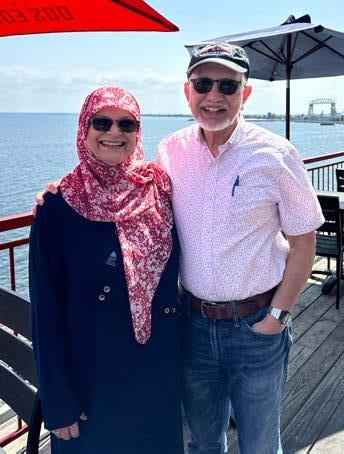
“When my husband and I moved to Minnesota for graduate school in 1979, we had no idea how to raise Muslim children in America. Zaytuna’s founders were our primary source for increasing our knowledge, strengthening our Islam, and exploring our identity conflicts as Muslims in America. For nearly twenty-five years, we have been overjoyed to support such important work. As educators, we deeply appreciate the importance of building this institution. Supporting Zaytuna is our way to leave a legacy and support other Muslims in the west.”
— Taslima Khaled
“Some would say these are dark times. Muslims face a lot of challenges. We have to be able to stand for ourselves and present our own narrative based on truth. We have to do this sincerely, intellectually, and beautifully. Zaytuna College is doing this important work.”
— Omer Khalil
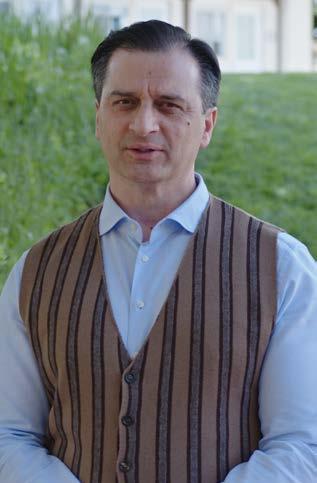
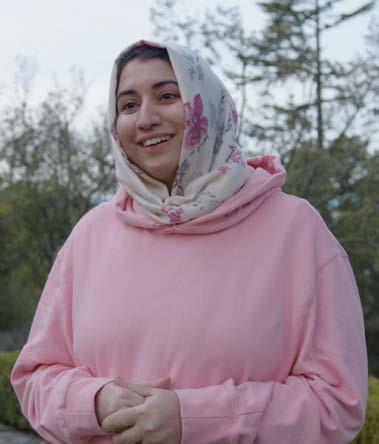
“What inspires me about Zaytuna is the rich diversity of its student body. It’s reassuring to see that all kinds of Muslims are welcome here—including my own children one day, inshallah. It’s hard for me to imagine our children navigating this increasingly complex world without being rooted in the Islamic tradition. Supporting Zaytuna College is a way to ensure generations to come can become rooted in their tradition.”
— Fatima Maryam Hussain
Statement of Financial Position
Statement of
(All
The executive leadership remains focused on meeting the financial demands during this remarkable growth phase at the College. This includes not only operational demands but also capital needs as the College invests in expanding the campus for a rapidly growing student body. The revised strategic plan includes effective measures to limit expenses by improving operational efficiencies.
For revenue growth, three core areas are prioritized: endowment, 12000 Strong (monthly giving program), and programmatic revenues (tuition, online courses, and Curriculum Series). The Endowment Committee has partnered with a reputable investment advisory firm that guides the short-term and long-term investments of the College’s growing endowment funds, while maintaining compliance with the institution’s sharia and ethical standards. The 12000 Strong program provides an important revenue source that is uniquely diversified in terms of its donor base, allowing for smaller gifts to collectively have high impact. The College aims to have at least 70 percent of the operational budget subsidized by these main revenue sources by year 2030, inshallah.
Board of t rustees
Pervez Qureshi, cH airman | Syed Mubeen Saifullah, s ecretar Y and t reasurer | Faraz Ahmed | Dilshad Dhanani
Dr. Marianne Farina | Masood Khan | Muhammad Mian
Dr. Suhail Obaji | Dr. Farah Rana
e xecutive t eam
Dr. Hamza Yusuf, President
Dr. Aisha Subhani, v ice President
Dr. Ali Ataie, d ean of u ndergraduate s tudies
Professor Mahsuk Yamac, d ean of graduate s tudie s
f acult Y
Shaykh Talal Ahdab, l ecturer | Dr. Abdullah bin Hamid Ali, a ssociate Professor | Imam Tahir Anwar, l ecturer | Dr. Ali Ataie, a ssociate Professor | Dr. Cindy Ausec, a djunct f acult Y
Dr. Rabia Bajwa, a ssistant Professor | Dr. Hatem Bazian, Professor | Qari Amar Bellaha, l ecturer | Dr. Mohamed Boufares, a ssociate Professor | Dr. Phillbert Cheng, a ssistant Professor
Dr. Fadi Elhin, a ssociate Professor | Dr. Uzma Husaini, a ssistant Professor | Dr. Youssef Ismail, a ssistant Professor | Dr. Lawrence
Jannuzzi, a djunct f acult Y | Dr. Munir Jiwa, a ssociate Professor
Shaykh Faraz Khan, l ecturer , s enior r esearc H f ello W
Dr. Eiyad S. al-Kutubi, a ssistant Professor | Ustadh Yusuf Mullick, l ecturer | Fr. Francisco Nahoe, a ssistant Professor
Dr. Jawad Qureshi, a ssociate Professor | Dr. Esma Sag Sencal, a ssistant Professor | Dr. Harun Sencal, a ssociate
Professor | Dr. Asad Tarsin, r esearc H f ello W
Professor Mahsuk Yamac, l ecturer